#you were complicit in your own and as other women's oppression
Explore tagged Tumblr posts
Text
I keep seeing this post with those awful reblogs on my dash and I genuinely wish most people in the reblogs were more ashamed to speak about this. Even if those specific reblogs don't name it, this is very blantantly about women since they are the overwhelming majority of people who say they hate men and hold them accountable. Even the other reblogs understood this since a lot of them are openly blaming women (regular feminists or radfems) for this. Some of them are even talking about misandry all the while women are losing their reproductive rights and bodily autonomy because men decided it. Have more shame in your life.
Women being scared of men in the streets is not oppression. Women having to make spaces just for themselves where they don't have men constantly sexualizing them isn't oppression. Men ARE factually destroying the lives of millions of women, sometimes even before those women are born. The most women do is mean posts online and not being sexually available to men. With the current political climate it is very much normal for women to be angry at and distrust men when they all overwhelmingly voted for them to lose their rights. It is normal to blame them, because they are to blame. Misandry is not real, men aren't oppressed, the most they get is side effects from forcing their way into a position where they are able to alienate a bit over half of the population. Minority men have power over and oppress the women in their own minority groups. Feminism does not need to center men's issues to be "good feminism". Feminism is for women and women are the victim of the patriarchy, not men. Men's biggest enemy will always be other men, not women. Women don't need to be nicer. It's not their responsibility to put themselves in actual danger in hopes that maybe some guys won't want to rape or murder them anymore. I would actually strongly argue that leftist men are in the position with the most power to change things. Men listen to other men more than they would ever listen to a woman, even moreso when they are radicalized misogynists. I just can't with tumblr and all the people claiming this is "the terf rhetoric that made leftist spaces bad :(". Just say you hate women and feminism at this point, because this is the most basic of feminist analysis: that women as a class are oppressed by the class of men, and that they won't stop by kindly asking them to. This isn't even radical feminism with how basic it is and has nothing to do with trans people. What actually makes men misogynist is, shockers, misogyny. Andrew Tate was popular not by being a nice guy who helped out other men but because he dangled in front of millions of men's noses the patriarchal dream they've been taught to want: being the money earner and having the ability to own women as property. And constantly shutting down women and their fight for their rights or telling them they're actually the ones who caused this because they were too mean is what is encouraging more men to be this way. Complacency with systemic misogyny will just create more misogynists. And to break out of that, people (mostly men) from both ends of the political spectrum need to stop shutting down feminism and actually take responsibility for their own actions and thoughts. All men are complicit in this until they finally call misogyny out too. Women's hatred of their oppressors isn't the issue.
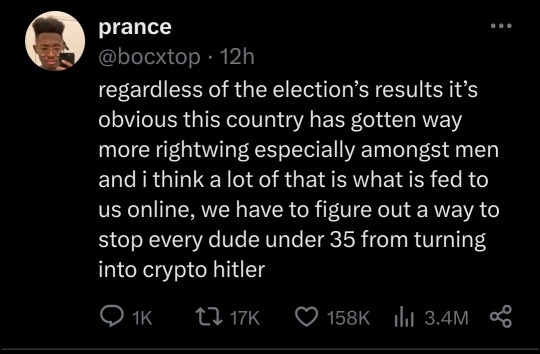
I couldn't have said it better myself.
#i'm not saying this lightly - i have never met a man who didn't have at least some misogyny in him#because they're just taught to be that way#even leftist men don't care enough about misogyny and women to introspect and stop being misogynistic sometimes#it's been painful to see on this social media platform people claiming that any criticism of men is actually evil and terfy#or that “it sets feminism back because it encourages gender roles” or whatever the fuck those people are saying#like i really want to discount it as terminally online shit but the internet is impacting real life ideologies so much it's shocking to see#this in response to trump being elected#but yeah just venting it's been gross seeing this happen
73K notes
·
View notes
Text
nothing sends me into a bigger feminist fury than those stupid fucking lash extension reels/tik tok/videos or just any content about fake lashes in general, not only are they an incredibly misogynistic idea, they're also potentially very dangerous but not ONLY THAT, THEYRE ALSO SO FUCKING UGLY YOU LOOK LIKE A MUPPET STOP FOR THELOVE OF CHRIST STOP
#trix talking#women with lash extensions: you look so fucking stupid#you paid so much money for them#you sat for hours while they were put in#you put your eyes in harms way#you were complicit in your own and as other women's oppression#and you look fucking terrible#as well as*
5 notes
·
View notes
Note
Why do people think Patriarchy was only practiced by a small portion of men Both "feminists" and Anti-feminists say this. I'm pretty sure most men participated in it because we learned about this in world History. Cultures outside of the U.S have their own histories of sexism and Patriarchy as well.
i think because that's easier to stomach. if we acknowledge that all men are complicit in maintaining the patriarchy, that means there is not a single male who doesn't benefit from your subjugation. it means men have chosen to support a system of male supremacy even if they themselves can't reach the top of the social ladder, because there will always be a woman beneath him. it means the men you love see how other men around them treat women, and they either endorse it or do nothing about it. (even if he does, he's outnumbered.) it's men giving other men permission, constantly, to keep women beneath them. whether it's participation or inaction. even better for the "feminist" man, who gets brownie points simply for saying women should not be raped (but who is doing the raping? he doesn't say).
and like you said, this system is global. it wasn't created because of capitalism or some other, "bigger" axis of oppression. men aren't being manipulated into it by some worse social force. it exists because it benefits them. they've had thousands of years to dismantle it, and if it were truly only a small ruling class of men perpetuating it, it would only exist in the highest echelons of society. but we know that isn't the case. men of all statuses oppress women of all statuses. they all benefit.
200 notes
·
View notes
Text
Radblr constantly talks about how woman should raise boys right and teach them to respect women.
Radblr also talks constantly about how women should support and work with other women.
But I never see radblr talking about how women should uplift, encourage, and support girls 🤔
Girls are the most vulnerable group of people on earth, and also the most powerful force of social change.
Millenial girls grew up to embrace liberal choice feminism and spread it through pop culture. Where was radical feminism during 1995-2010 when millenial women were just girls? What were radical feminists doing when we were all playing with bratz dolls and watching totally spies? I’ll always have nostalgia about the 00s pop culture I grew up with. But, that culture was the breeding ground for the choice feminism self exploitation hell we live in now. Spice Girls, Cheetah Girls, Destiny’s Child, Pussycat Dolls and Britney Spears were all marketed to millennial girls age 6-10. How is there any doubt about why millenial women are teaching gen-z girls to exploit themselves? It’s tempting to think of libfems as malicious narcissists or shallow idiots, but they aren’t. They were girls groomed for ‘sex positivity’ through 00s pop culture. They were girls radical feminists failed.
Radical feminism is always defined and organized around the root of subjugation women face–sex and reproduction.
Why not organize radical feminism around the root of female future, power, and success–girls?
Feminism is called a women’s movement. Occasionally, it’s referred to as a movement for women and girls. I think prioritizing women over girls in our concept of feminism is one of the greatest mistakes feminists ever made.
Feminism should be a movement for girls, supported by women.
If you are 20+, you are no longer, by any stretch of the imagination, a girl. I know girlhood is hell. I know it leaves us scarred and wounded. I know we feel the universe cheated us out of a girlhood brimming with carefree adventure and exploration. But it wasn’t the universe cheating us. It was adult women failing us. Adult women who were too focused on the damage their own girlhood did to them. This cycle of girlhood trauma has left women’s movements chasing their own tails for a century.
Patriarchy is passed through generations by men socializing boys and women socializing girls. If men are initiating boys into the fraternity of sexual subjugators, women are initiating girls into the sorority of victimhood. Radical feminism was built within that sorority, and it shows.
All feminist writing I’ve read delineates women’s historical trauma and ties it to the subjugation of women in contemporary society. Through feminism, we find other women and discuss our shared past traumas with each other. In the internet age, we do this on a personal level through blogs and forums, or on a societal level through hashtags like #metoo and #yesallwomen. Feminist discourse builds up to a model of women’s universal suffering. And through that we identify males as the bastards behind it all. Radical feminism calls class recognition through shared trauma ‘consciousness raising’. They cite consciousness raising and solidarity between women as the greatest sources of female power. In other words, radical feminism elevates the sorority of victimhood as the key to female liberation.
But the more I piece this out, the more it looks like a damn crab trap. The shared trauma, the model of women’s universal suffering, it only leads us to perpetuate our subjugation. There’s comfort in thinking what happened to you happened because you’re a woman. There’s comfort in seeing traumatic events as predestined. But predestination is the oldest crab trap in the book. Through predestination, we see victimhood as a right of passage and a key to wisdom. We overlook naive girls until they’ve been victimized enough to trauma bond with women.
I’m not saying we should throw out radical feminism and start from scratch. Women coming to terms with trauma is a step towards female liberation, but it’s a step that will take a lifetime. That, unfortunately, is the nature of trauma and PTSD. There is no way to resolve past trauma. You can read all the feminist discourse ever written, and you may find some comfort in it, but the trauma will not heal.
I know a lot of us take comfort in that catchphrase about women not being responsible for our own oppression. We need to start recognizing this as a thought terminating cliche and blackpill feminist idea. Saying we have no hand in our own oppression means women’s liberation depends entirely on men. This, of course, renders women’s liberation impossible.
If we’re looking for more than comfort, we’re going to need more than radical feminism is currently offering. If we’re looking for liberation, we must do the most uncomfortable thing possible. We must dismantle the victimhood sorority. We need to stop saying our trauma happened because we are women. We need to stop being complicit in patriarchy by holding up victimhood as a right of passage to womanhood.
Women do not have to suffer. Women do not have to be victimized. Girlhood does not have to be characterized by neglect. If we use all the power of women’s class solidarity to protect and celebrate girls, we will escape the cycle we are in. We need to stop prioritizing the lives of women over the lives of girls. We need to make girls’ liberation the primary goal of feminism, even if we have to sacrifice personal freedoms to do so. That is the true right of passage. Being an adult doesn’t mean perpetuating the past into the present. It means passing up on your needs in the present to secure a better future for the next generation.
Your inner girl will never heal until you become the woman that should’ve been there protecting you as a girl. So, become that women, and do everything in your power to lift up girls. Do everything in your power to give them the carefree adventurous girlhood you were denied. Don’t do it because they’re your daughters or surrogate daughters. Do it because they’re the future, and they are more important than we are.
#i'm not discussing men here because they're irrelevant#too much of feminism tries to solve the problems of men#if we let go of the problems of today's women to focus entirely on the problems facing today's girls#those girls will grow up to be more powerful than we could ever hope to be#i thought about editing this down but... no lol it all needs to be said#radfem#radblr#radical feminist#radical feminism
640 notes
·
View notes
Note
I don't like the reira/layla very much, my feminist side wants to spank her, everything her plot turns into a man, ahhhhh boring woman apart from that. what do you think of her?
I'm. ok. okokokokokok.
I'm gonna be honest. This is the most bonkers ask I've ever gotten in over 10 years of being on tumblr.
Like, you want to spank her?? Your feminist side???? Is there like, a feminist way of spanking I don't know about?
idk, spanking has Connotations. And while I'm assuming it has no sexual meaning here, I mean... what? You want to punish her? Not for being a child predator, but for... having a storyline in which revolves around a lot of men? You want to commit violence against a woman in the name of feminism, and not in the name of harming someone complicit in child sex trafficking? You want to use corporal punishment in the hopes of teaching her a lesson, despite a multitude of studies saying that it doesn't work and it's just abuse? You want to spank her like she's a child, when my last post has an entire section dedicated to why I don't like people treating Reira like she's a child?
I'm just confused.
And how is any of this connected to your assumed feminist side? Cause I'm sorry, no hate no bad feelings but. Sounds more like a watered-down feminism buying #GirlPower t-shirts at Forever21 for $25, that believes women can be at fault for their own oppression as women if they don't act a certain way. Very “There is a special place in hell for women who don’t help other women.”
Since you asked me, I think Reira is FACINATING. The way she acts as a foil to Nana and Hachi's bond as women, where Reira lacks any female friendships other than Mari who is her employee. Like, I find that to be the part that I notice about Reira most.
And the way Reira is floundering, unsure of who she is outside of her voice because every achievement she's made as a singer were not by her own action, but Takumi's. So instead she turns to romantic relationships with MEN yes trying to find some other meaning for herself. Yasu breaks up with her so she can move to Tokyo for her singing career, Takumi revolves his entire career empire around her voice, and Shin who she broke up with for her career.
So all she's left with is her voice, but when that's all she has... I mean what can she use that voice to even say?? FACINATING. Especially when the one time she uses that voice in a last ditch effort to use her voice for something good, she does it by choosing to use that voice, her only strength and good point, and Ren DIES. Like how very The Little Mermaid women-shouldn't-give-up-their-voices-for-men of you Yazawa.
And there's a lot of reasons to not like Reira to be sure - people are free to not like or dislike any character for any reason.
Such as Reira being for all intents and purposes, is a child predator, specifically of a child who is being sex trafficked??? Like the narrative only really sees it wrong in so far that it's socially unacceptable and not that it's an actual moral evil to do. But then, as was recently pointed out to me, Reira has turned her reliance on male children into an actual pattern with Ren Jr. Like that's a whole post on it's own, unpacking how Reira who can be likened to a song bird in a cage, a princess in a tower, who only has her voice... using whatever little power she has in her life to ensnare young boys into her orbit.
I seriously want to reiterate I'm not Mad or anything. This is just my own personal feelings, but I guess you asked for them. I’m just always gonna find Reira hate to be suspicious if there is no mention of her relationship with Shin, because that’s her biggest red flag. You don’t have to agree or anything but idk. Maybe be more careful when sending Anonymous asks to people cause idk I guess I do find asks of this nature to be disturbing.
46 notes
·
View notes
Note
I dont understand how sessrinners include people of color are not affected by Yashahime who whitewash Shiori 's skin by colorism
The same way both women and poc voted for Trump I would guess…
Not everyone is aware of being complicit in their own oppression, various-ism. Women will vote and stand by legislation that hurts women. People of colour will side with racists on issues like colourism, people with disabilities will stand with ableists. People do it all the time. I dont really understand it well but theyre not unique.
Craisins (many not all) do not stand up against their own really. I dont know if its fear of not having the solidarity, fear of policing one another will make them look bad, or of they genuinely dont care. Just like antis are made up of a bunch of people with different ideologies so are Sessrinners and if they could get off this “you’re and Anti so your opinion doesn’t matter” kick they might learn something. Or you know realize that the ship is not the only issue of yashahime.
Its my biggest one, but you also have colourism, transphobic characters, child slavery, other potentially questionable shipping of minor and adults or unacceptable or questionable age gaps. Not to mention pacing etc.
But because we’re anti ship, they dont care about our opinions. Apparently because were anti’s were not allowed to have opinions.
14 notes
·
View notes
Text
3. Copley: And our kingdom is gone
White glowing skin, touched by stars,
kissed by silver moonlight.
When Joe gets up and leaves the room with one last stroke of Nicky's head, just as Copley has entered the living room, Copley asks himself when the immortals started to trust him.
Andy and Nile are exercising in his backyard and Copley, hoping they don't destroy his amateur herb patch or his dahlias, has tried very hard to give them privacy. By that he means that he is not standing on the porch like a stalker and watching the two women attack each other without mercy and with deadly skill, faster than he has ever seen.
Astonished, he stops and stares at the door Joe has disappeared through before he realizes that he is not alone in the living room. Nicky nods slightly to him, one corner of his mouth curved into something like a half smile and Copley only realizes that because he has spent the last few days closely observing the immortal warriors and analyzing their behavior.
Copley has always considered himself to be a passable, if not a good judge of people - this skill was very helpful in his job and served him well. But Nicky's micro-expressions are on a completely different level. He seems perfectly at rest within himself and nothing in his face indicates what is going on inside him. Admittedly, Copley finds this just as intimidating as Andy's sharp presence, Joe's death look and Nile's powerful charisma. Nicky must be really good at playing poker, Copley thinks, and inwardly shakes his head because it's like wondering what Joe likes to do in his free time besides the obvious drawing, or what kind of ice cream Andy prefers to eat. And Copley isn't sure that the relationship between him and the ancient warriors can be considered as that familiar.
He fully understands their vigilant, suspicious attitude towards him and is determined to help them with their current problem, because he is complicit in the events that have happened and hopes to gain their forgiveness. Guilt and shame are still present in his heart for being blinded by the prospect of helping people with illnesses like the one that plagued his wife, even though all the signs of Merrick's sadistic play were right under his nose.
All the more, the fact that Joe left him alone with Nicky in a room, presumably to use the bathroom, feels like a minor victory, and Copley tries not to seem too baffled by it.
The minimal change in the bright mountain lakes that make up Nicky's eyes shows that he's not doing as good a job as he has hoped. In Nicky's eyes and the features around his mouth, the most emotions can be read, Copley noted, even if it will take him a lot of practice to see as much in Nicky's face as Joe. He will probably never reach this level, because he certainly does not have 900 years for a character study.
Nicky's minimal facial movements also make it harder for Copley to tell if he's in pain or to recognize the warning signs that precede any vomiting of blood - which is now occurring with terrible regularity.
Since he has found a tough nut to crack in Nicky, Copley has started to pay attention to Joe after Nicky's first blood break, in order to learn more about Nicky's behavior. With this tactic, Copley adds daily to his mental list of Nicky's signs of certain sensations, and to his chagrin, the signs of physical pain seem to be increasing in frequency.
Copley, one of those people who whine hard when they stub their little toe, admires the stoicism with which Nicky endures his rapidly deteriorating condition. Only his slow, sluggish movements and a barely noticeable frown are frequent indications of Nicky's discomfort, as well as a slight lowering of the corners of the mouth and the twitching of his jaw pointed out for Copley by Nile.
And of course the tremors from the chills going through Nicky's body at that moment. In addition to the thick hoodies, they pulled out all the stops with various blankets, socks, hot-water bottles and tea and Joe gives Nicky his body heat anyway, just like Andy and even Nile.
This deep, family bond between Andy, Joe and Nicky is met with great fascination by Copley and although Nile has only been an immortal for a few weeks, even Copley can see how easily the young woman has integrated into the team like a matching piece of a puzzle. It also shows him how much the emptiness of his house oppressed him after the death of his wife and that he finds himself wishing to be a part of this unusual family of extraordinary individuals.
With a quiet clearing of his throat, Copley de-freezes himself from where he has been standing for an alarmingly long number of seconds and turns the heat up. With the onset of autumn it is not a problem to heat so strongly because the nights are gradually getting colder. And Copley finds that he's already used to the high temperatures in the constantly heated living room. Sweating a little to keep Nicky from freezing as little as possible is probably the least Copley can do.
"Thank you, Mr. Copley," Nicky says, returning his attention to the open book in his lap, which Copley cannot identify as one of his. While he grimaces inwardly - whether that's because Nicky is the only one who continues to call him Mr. Copley, or because of how rough and strained his voice sounds, Copley can't tell - he sits down in the place where he is working. At least when he's not in his study. Actually, the professional atmosphere of his office always helps him to be more productive, but since Andy and her team moved in with him, Copley has gotten used to finding the presence of the others very pleasant.
When Joe returns, Copley is back to work retracing Meta Kozak's footsteps. She is currently moving from the western US towards New Mexico, but Copley doesn't know what her destination is or where she is keeping any evidence from Merrick's lab and that makes him angry at himself. He tracked Andromache the Scythian and her group of immortal warriors down so he shouldn't have any problems pinning Kozak down too. On the other hand, he had time to track down the immortals, and in this case it seems to be running like sand through his fingers.
Neither of the others is pushing him to hurry up or do better work, which Copley appreciates, but they all see Nicky's crumbling form every day.
Five minutes pass with no sound coming from the sofa, except for the occasional rustle of paper when Nicky turns a page or the sound of Joe's pen in his sketchbook, and Copley longs for a fifth cup of coffee.
"Copley?"
"Yes?" Even if Copley suspects what Joe wants from him, he takes his eyes off the irritatingly bright screen of his laptop to look at him.
Joe's dark, serious eyes are in such a strong contrast to the soft, warm expression of affection that they always take on when they come to rest on Nicky. "Is there-" Joe pauses to reconsider his choice of words, but Copley realizes in it the unrest that comes with Copley's own uneasiness. "- any news?"
To be honest, Copley prefers an angry, menacing Joe to the version whose tiny spark of hope Copley has to stifle over and over again, and he hates it. Still, he keeps his calm and shakes his head. "No, I'm sorry. I was able to locate her on the recordings of a hotel in Phoenix, Arizona, where she stayed for three nights. But I can't tell where she's going next. My guess is New Mexico, but she has changed direction several times in the past two days.” He sighs and shakes his head again. "She is very careful, which means that she expects you to search for her."
The pale, blurred face and cold, lifeless-looking eyes on his laptop cause a disgusted, hate-like feeling in his stomach. Copley wonders how he could ever expect from such an immoral doctor who sliced people up for the Nobel Prize and took samples without letting herself be disturbed by their screams of pain to do something good for humanity.
Joe nods slowly and turns to his drawing with furrowed eyebrows, chewing on his lower lip and Copley looks at Nicky, only to notice that Nicky's focus has long been on his love. Copley thinks he sees something like concern in Nicky's eyes and then he reaches out his hand and squeezes Joe's, saying something in a lowered tone in that strange language and Joe snorts and grins slightly.
Copley has seen moments like this quite often lately. It's no secret that Nicky's condition weighs as heavily on Joe as a block of cement, and while Joe is definitely a smiler, there's nothing like it to be seen. Dry comments from Andy or deliberately silly jokes from Nile make him smile and, at best, even laugh a little. But only Nicky manages to ignite the humorous spark in his eyes and he does that as often as possible.
In the same language, Joe replies something, causing a low snort from Nicky about that Joe looks so happy, as if he had won the jackpot, before he seeks Copley's eye contact again. "Thank you, Copley."
Copley high fives himself in his head for the further progress he's made with the immortals and smiles. "Of course, I will keep you informed about further results."
"We really appreciate that," Nicky says, putting his book aside. He coughs heavily and Joe is immediately on alert, ready to jump up and grab the bucket they've positioned next to the sofa since the accumulating blood-vomiting, but Nicky pulls himself together. "Have you eaten anything today, Mr. Copley?" He asks hoarsely.
"I beg your pardon?" Copley blinks.
Up to this point he hasn't even given a thought to food and is amazed to realize that he has actually not eaten anything since last night because he was too busy following Kozak's trail. As if on command, his stomach growls softly and Copley is stunned that Nicky pays remarkable attention to who is eating what and when.
"Oh," Copley says, staring at his keyboard and then at Nicky, who is patiently waiting. "I'm afraid not, no."
He didn't even finish his sentence when Nicky gets up from the sofa - so slowly that it's painful to watch - and heads for the kitchen. "Do you like French omelettes?"
"Nicky-" Joe is hot on Nicky's heels, which is no wonder given Nicky's slow pace, every step taken so carefully, as if every move would hurt him. Because Nicky is supposed to take it easy and rest, Andy and Nile have thrown him out of the kitchen a few times because standing at the stove had exhausted him. And even if Copley doesn't know all the habits of the team by a long way, he can see how much Nicky loves to look after his family and that cooking and baking gives him great joy. This makes it all the more difficult for him not even be able to do that.
And the way Joe looks, he is more than aware of it. But instead of putting Nicky back on the sofa and advising him not to use the kitchen to make Copley a French omelette because it could harm his condition, Joe just says gently, "May I help you?"
It is not a statement that has been disguised in a question to avoid contradiction. It's a real question that Joe means wholeheartedly and leaves Nicky to decide whether he wants to work alone in the kitchen or to be helped. Joe didn't ask if he could cook, but asked Nicky's permission to help him cook and leave the main work to Nicky. And that Joe pays such careful attention to Nicky's feelings and wants to do something about it that he feels useless, moves Copley more than he would have expected.
Copley only catches a glimpse of the smile Nicky only saves for Joe. "Of course, hayati." Copley can't miss the underlying gratitude.
Continue reading on AO3 ;)
4 notes
·
View notes
Text

(creating a new post because the original one was being passed around radfems circles and the notes were absolutely toxic - link to original even though it seems to have been deleted by op)
I wasn’t initially gonna reblog this because I was like well, I don’t think traditions like these should be completely beyond reproach / criticism and although I did have my ears pierced as a baby and am personally glad of it, it isn’t something that I would do to my own daughters if I had them. But then I checked the notes:

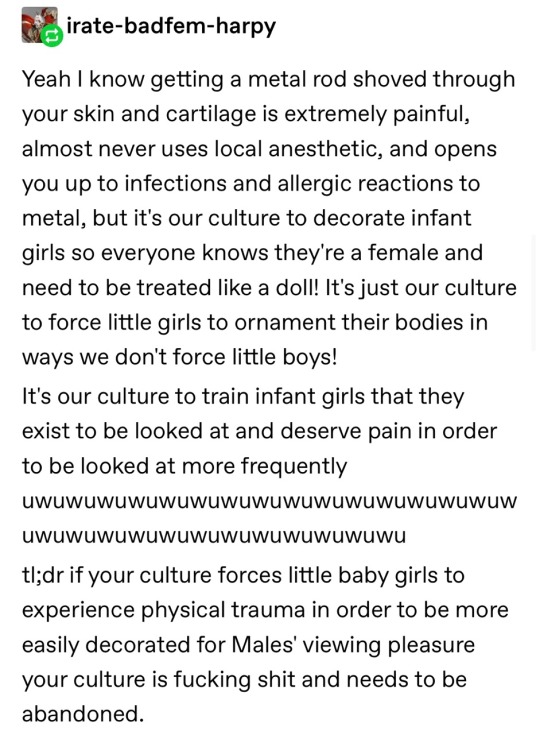
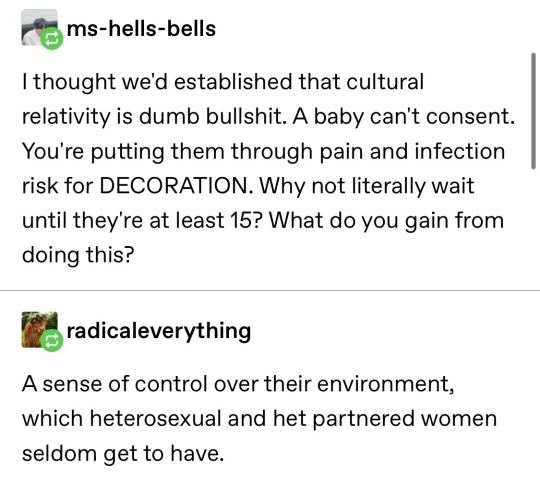
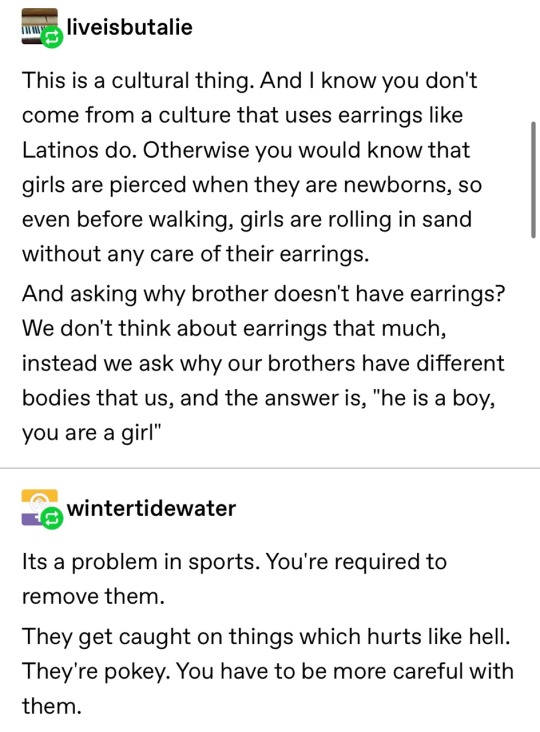


and I take that back because the people replying to this post prove exactly why it’s fucking needed. Because white women (especially white radfems, whom most of these are) really don’t know how to behave themselves when talking about woc / other cultures. “It makes girls into objects to decorate and look pretty” “A sense of control over their environment which heterosexual and het partnered women seldom get to have” “not owning her body that began with her mother piercing her skin against her will” these people are acting as if woc are literal child abusers for doing something that yes, although it may be a gendered ritual and not one I personally agree with, does very little harm to their child in the long run.
First of all, there are actual cultural / religious roots to the ear piercing of children (x) and yes, it was done to both female AND male children, although it has become more of an aesthetic thing nowadays and boys being pierced is much rarer. I don’t have any concrete sources on this but I’d be willing to bet it’s to do with the influx of western culture starting with colonialism that brought the idea that earrings / jewellery are unmanly and therefore unattractive. In fact, jewellery in general and especially gold jewellery does play a significant part in Indian culture and I know Indian boys who have gold chains that they wear around their necks and have since they were a child, although I don’t know the specific significances of these. My point is, if you actually bothered to research the culture for even two minutes, you’d see that this was about more than just “omg girls being decorated for men to look at!!!”. And even if you don’t agree with the culture of piercing children’s ears, which, as I said, I don’t particularly personally, it’s really not the massive deal that some people in the notes wanna make it. I’ve had my ears pierced since I was a baby and trust me, they have never ever held me back in life. I never even considered them much. You know what probably did affect me more? The general messages I was being fed to me by society that I had to look feminine and pretty, and have “girly” interests. Makeup culture. Beauty culture. My earrings are really very very low down on the list of things that had a big impact on my life. “Why don’t you wait until they’re at least 15” “Because it’s about establishing from a young age that they’re possessions / for male decoration / that exist to be looked at!!!!” etc. etc. No, a lot of the time it’s literally so that it’s done early on and then they don’t have to go through it later. Piercings can be traumatic at any age. My friend decided to have hers done as a young teenager and it left her so scared of them closing up and having to pierce them again that she literally wouldn’t even sleep one night without earrings on. Meanwhile, I had it done as a baby and didn’t even remember. Again, is this something I would choose to do to my daughter? No, but at the end of the day I don’t know a single person who got their ears pierced as a baby who is genuinely upset and resentful about having it done, because it’s really not that much of a big deal. “It sends a clear message that your body doesn’t belong to you” “it’s our culture to train infant girls that they exist to be looked at”! My parents, contrary to apparent popular belief about desi parents, have never encouraged me to exist for male consumption. If there is one thing my mum and dad have tried to impress on my my whole life it’s that education is the most important thing and it comes before boys or relationships or anything like that. My dad has told me on no uncertain terms that my education, my life, should always come before relationships and marriage. And yes, my mum also decided to have my ears pierced when I was a baby because that is the norm and she wanted to get it over with when I wouldn’t even remember it so I wouldn’t have to get it done later if I wanted them pierced. Even recently she’s told me she’s felt guilty about it when she hears people saying things like this and that makes me so angry because my mother is not perfect, but she deserves a fucking lot more respect than these people are treating her and women like her with.
These are the three that pissed me off the most:



White feminists really do not know how to talk about woc without projecting their own narrow ideas of cultural misogyny onto everything they do. Like they’re literally taking the actions of women from cultures they know nothing about and trying to analyse them and pile patriarchal reasoning onto them - and basically assuming that all woc who aren’t from western / “developed” countries are a monolith who all share a hive mind designed around upholding the patriarchy and can’t think for themselves, unlike the enlightened western feminists who have the critical thinking necessary to see through everything.
Radfems will use the violence and misogyny faced by women of colour in countries like India etc. to prove their points and then will turn around and show their faces with posts like this where they demonstrate that they don’t really care about them except to prove a point, and that any compassion and sympathy that they have for them ends when they don’t act in ways that aligns completely with their beliefs. You’ll talk about how misogynistic and terrible things are for women in countries like India but as soon as they don’t completely conform to how you think they should behave (mostly because of the societal pressures they face) they’re suddenly agents for the patriarchy who are seeking “a sense of control over their environment which heterosexual women seldom get to have”. “It’s not clear to me what it has to do with being white or not” what it has to do with being white is that white radfems absolutely refuse to treat women of colour with respect and acknowledge that we have different experiences to them except when it’s to shit on our culture for treating us badly without actually caring about us as human beings!
Do I think desi culture is absolutely beyond reproach or criticism in the way it treats women? No, there are certain aspects of it that absolutely disgust me (as do aspects of almost every single culture in the world). However, if you really cared about the misogyny and violence faced by women in these countries, you’d use your voices to uplift them and listen to their problems and support the causes they think are important and will improve their lives instead of just using them as a stage to soapbox about your own opinions. But of course, you couldn’t do that! Because they might think the wrong things are important! Because they don’t see the world through your special enlightened western feminist eyes who can see that earrings are the real root of the problem!!!!!
Again, I don’t personally agree with this tradition and I don’t think it should be above criticism, but it certainly isn’t awful or horrible enough to justify the sheer amount of vitriol directed at women of colour who do it - as op was trying to say from the beginning, it’s really not that deep. And in addition, what this post has done is reminded me why even if I do think a cultural practice should be criticised, I absolutely don’t trust white feminists to be the ones doing it. This isn’t me saying “my culture is perfect and beyond any reproach or criticism”, this is about white women not knowing how to behave when talking about women of colour of other cultures and being unable to talk about them without acting as if they know everything and projecting their own preconceived ideas about why the people of that culture behave the way they do in order to get their own points across about the society they themselves live in while simultaneously throwing the women of that culture under the bus by treating them as if they are completely helpless naive victims or agents for the patriarchy who are complicit in their own oppression, and either way are not enlightened enough to see through their culture in the way that only western feminists can.
698 notes
·
View notes
Text
Kevin Can F**K Himself Shows Why The Laugh Track Needs to Die
https://ift.tt/eA8V8J
The title card for the new AMC series Kevin Can F**K Himself isn’t accompanied by a jaunty tune or a wild sound effect. When the title appears on the screen, it’s soundtracked by a smattering of aggressive laughter. Creeping up below the laughter is a distressing screeching noise, meant to indicate the rapidly fraying sanity of our heroine.
So it’s quite fitting that Kevin Can F**K Himself makes a compelling case for why laugh tracks (or canned laughter) need to die a quick death. The series centers on Allison McRoberts (Annie Murphy), a woman trapped in a marriage to the titular Kevin. Kevin is an infuriating man-child. He throws keg parties on his wedding anniversary, spends obscene amounts of money on sports memorabilia, and treats Allison like an accessory. He is emotionally abusive, often making Allison feel worthless by telling her things like she’s a bad driver or that she never finishes things so that he can keep her all to himself.
Approximately a third of the series takes place in lala sitcom land in which the lighting is abundant, the set is clearly facing an audience, and Kevin is always there, chewing up the scenery like Pac Man chowing down on glowing dots. However, whenever Kevin exits, Allison finds herself in a more contemplative and complex (aka: single-camera) existence. The trouble is she doesn’t have much of an identity anymore because her entire life has hinged on being Kevin’s long-suffering wife. The juxtaposition of the sitcom world against a more realistic setting serves to illustrate just how jarring and unnecessary canned laughter is to a TV show. When we watch dramas, we don’t hear people bawling over the sad parts or gasping during the shocking moments. Nope. So why do laugh tracks persist?
As an early millennial, I grew up in a world in which laugh tracks were the norm. From “Must See TV” on NBC in the ‘90s to the vintage sitcoms on Nick at Nite, comedy was always served up with a heaping side of giggles and guffaws. Historically, the sitcom cadence did rely on a call-and response reaction as they actually were often filmed in front of a live studio audience, but it was rare that the responses that made it to the final episode were genuine and uncut.
To be clear, when I’m referring to canned laughter here, I’m not just referring to the prerecorded kind. Sure, that might be the official definition, but even the laughter we hear from live studio audiences is goosed in some way prior to airtime. The practice of “sweetening” the laugh track, or adding in favorable reactions to amplify certain jokes has been in practice for decades, and it’s still in use today. While the creators of a show might be able to proudly say that the reactions came from an actual audience, the reactions are almost always tweaked in post-production in order to punch up the jokes that the creators or network want to land. Therefore, the laugh track on all of your favorite sitcoms is a lie.
An argument could potentially be made that the practice of adding in a laugh track might make people feel a sense of camaraderie or community with others watching. And this is somewhat true. In a 2011 article on laugh tracks, NBC News noted a 1974 psychological study in which it was found that people laughed more frequently if they heard canned laughter following a joke. These types of social cues can make individuals feel comfortable, but they can also promote conformity. Looking back on the history of sitcoms, it sure seems as if laugh tracks have been complicit in keeping misogynistic and racist messaging at the forefront of comedy.
Kevin Can F**K Himself plays with this idea in every frame of its sitcom world. Nothing is actually very funny within the brightly lit walls of the McRoberts’s house. As previously established, Kevin is simply awful. He’s a huge loser. Yours truly wanted to throttle him, Homer Simpson style, during every scene he was in. Yet, since the sitcom land dictates that Kevin is a damn delight, the audience plays along.
(It’s worth noting here that Kevin Can F**K Himself was filmed in front of a studio audience. However AMC tells us that, due to COVID restrictions, the audience was small and far away, so the laughs were not picked up on the audio. Therefore, much of the laughter you hear on the show was added in post-production.)
The dynamic between Kevin, Allison, and the viewers in the studio is an exaggerated version of a tableau that has been unfolding on our TV screens for decades. We see a harried, hot wife play a straight man to a dumpy doofus husband, and we’re all supposed to think it’s simply hilarious. It’s worth noting that Kevin Can F**K HImself cribs its title from the Kevin James’ sitcom Kevin Can Wait, in which the series unceremoniously killed off James’s first super hot wife on the show (Erinn Hayes), only to replace her with his prior super hot sitcom wife, Leah Remini. Because women are oh so very interchangeable in the sitcom world, the laugh track on that show never skipped a beat.
Canned laughter has historically enabled the entertainment world to lift up mediocre men such as Doug Heffernan (Kevin James), Raymond Barone (Ray Romano), and Kevin Gable (Kevin James, again) at the women’s expense. For ages, only a very small handful of white males were allowed to create content as showrunners, directors, and writers at networks. As they had control over the laugh track, they became the arbiters of what was funny and what was not funny. They got to shape reactions according to their worldview, painting the schlumpy dudes as heroes and the women as eager sidekicks.
While there are oodles of examples of the long-suffering wife throughout sitcom history, we rarely think of these women as victims. All in the Family is considered a classic, but Archie Bunker was viciously verbally abusive to his wife Edith in almost every episode. Sure, it was a different era (and Archie surely isn’t intended to be a role model), but take away the laughs, and what’s left is a depressing portrait of a red-faced husband straight up screaming at his beleaguered wife. And don’t even get me started on The Honeymooners classic line, “to the moon, Alice!” Ahahahaha, yes, spousal abuse. Hilarious. Well, the laugh track thought so, anyway.
In more recent years, verbal abuse on sitcoms focusing on husband-wife dyads has given way to a more subtle form of emotional abuse. Often, this appears in the form of financial abuse in which a spouse spends or hides money from the other in order to keep them in their place. In Kevin Can F**K Himself, Kevin consistently spends money without consulting Allison first. In one episode, he even proudly states that a recent purchase cost “more than our wedding, but less than our car.”
This type of abuse has played out in sitcoms forever. Doug Heffernan often hid his spending from Carrie, Raymond Barone invested in a go-cart venture without telling Deborah, and even Fred Flintstone stole money from Wilma’s hidden stash (yep, The Flintstones was a cartoon, but it inexplicably also had a laugh track). These transgressions are generally perceived to be harmless on screen, leading to those canned laffs and a resolution in 30 minutes or less, but in real life, this type of clandestine behavior in relation to finances can be catastrophic, trapping an unhappy wife in a relationship with no means to escape.
Even TV series that didn’t utilize the wife/husband premise – notably Frasier and Friends – often used audience laughter to support misogynistic punchlines. Friends notoriously used the laugh track to support harmful jokes about fat shaming and transphobia while Frasier’s archaic attitudes towards women were often played for comedy. Personally, I will never ever get over how Frasier Crane treated Roz Doyle, slut shaming her at every turn for over a decade when, in fact, Frasier was sleeping with half of Seattle with nary an eyebrow raise in his snooty direction. (Sorry, rant over. But, seriously, Peri Gilpin rules. #JusticeForRoz)
Laugh tracks help normalize these behaviors. If you’re not laughing at the joke when everyone else is, something must be wrong with you. Women have faced this exact dilemma since the beginning of time. Laugh along or be judged as cold and unfeeling. Be in on the joke or be tossed to the side. This truism is even noted in the recent HBO Max series Hacks in which aging comic Deborah Vance (Jean Smart) confesses to a newbie comedienne why she makes fun of herself in her own act. With a wan smile, Deborah says, “I realized they would rather laugh at me than believe me.”
These are the same exact challenges that Allison finds herself facing in Kevin Can F**K Himself. When Kevin is around, Allison tries her best to play the role she’s been given so that he won’t make her life even more miserable. No one believes or cares that Kevin is awful because they think Allison is lucky to even have landed a man at all. The series overtly illustrates that these types of stories have always just shrugged at viewers, telling us, oh well, boys will be boys, while women’s suffering is shoehorned into punchlines instead of taken seriously. Rather than confronting the thorny reality of disentangling the institutions that lift the Kevins up and keep the Allisons down, the sitcom world treats women’s pain like a joke.
After years and years under Kevin’s oppressive thumb, Allison isn’t laughing anymore. She’s full of rage and ready to break free. When we see her in her life without Kevin, there are no prescriptive beats dictating what’s funny and what’s not. And it’s so refreshing. Life can be funny! Sometimes Allison is funny in her real life too! Annie Murphy is also very very funny! And yet, even in the absence of a laugh track, viewers can pick up on the funny. Because in this modern age of entertainment, viewers are savvy enough to know what they feel.
As canned laughter has slowly disappeared, TV has opened up to more nuanced emotion, allowing viewers to discover and explore the highs and lows for themselves. It’s probably not surprising to learn that the few existing series that do still use laugh tracks, such as United States of Al and Bob Hearts Abishola – both airing on CBS and both created by Chuck Lorre – have been critiqued for leaning on racist and sexist stereotypes. Oddly enough, an urban myth has been circulating the internet for years, claiming that everyone on laugh tracks is actually dead because the recordings were made so long ago. As modern audio engineers now update their recordings regularly, this is not true, but the truth is that the laugh track itself is soon headed to an unmarked grave in the entertainment cemetery alongside tube televisions, Smell-O-Vision, and home video rentals.
cnx.cmd.push(function() { cnx({ playerId: "106e33c0-3911-473c-b599-b1426db57530", }).render("0270c398a82f44f49c23c16122516796"); });
With critically acclaimed comedies such as Schitt’s Creek (also starring Annie Murphy!), Fleabag, and The Good Place getting laughs without any pre-recorded assistance, home audiences are getting more savvy as to what’s actually funny and what’s just a cheap shot. In addition, social media and the ubiquitous sharing of memes have effectively displaced the laugh track, as people can now actually be part of an interactive community with others, watching and reacting to the same show at the same time.
In Kevin Can F**K Himself, canned laughter has finally taken its rightful place as a relic of the past. The chuckles and chortles that pepper the series are a knowing nod to a bygone era in which TV series tried to force the funny on viewers instead of letting them find their own way. Finally, laugh tracks aren’t in on the joke; they are the joke.
Kevin Can F**k Himself airs Sundays at 9 p.m. ET on AMC.
The post Kevin Can F**K Himself Shows Why The Laugh Track Needs to Die appeared first on Den of Geek.
from Den of Geek https://ift.tt/2UmnzJj
3 notes
·
View notes
Note
authoritarianism = wanting fic writers to have awareness of what they’re posting and know their potential audience??
literature has been banned (or burned for this matter) because it challenged the societal norms of that time/culture. this doesn’t equate to works of fanfiction depicting things that are morally corrupt to begin with.
what arch, or what lesson, does the reader get from those types of l fics? because all I see is a normalization/sexualization of pedophilia, incest, assault, etc. it would be different if these topics were written as a true experience that victims of these things go through. that’s also why music that corey taylor or jon davis have written cannot be used to justify this; those songs are a reflection of pain, heartache, and anger with the horrible shit that happened to them. the purpose of this is to show the listener that they aren’t alone in their struggle. their music has helped me with so much, especially knowing that both of them are victims of csa as well.
that’s why i’m not a purist, nazi, or whatever the fuck you want to call me. of course we should discuss these topics, but in a more meaningful way. we should take the depravity and hurt in us, and use it to inspire and help others heal.
one more thing- a couple of us, including me, are psychology majors. we know what we’re talking about. please refrain (unless you’re a psych major or a psychologist yourself) from trying to tell us how shit works within the field. (I could literally give you articles spelling out the dangers this shit causes)
have a good life ;))
If you hold amateur artists to a higher standard than professional artists, and you push that double standard as a kind of universal moral stance, and seek to censor and punish those who don't comply, and you don't see how that's absolutely draconian, I can't help you.
For anyone reading: Of all fandoms, Slipknot is one of the stupidest ones to police. Their work is aggressive and violent. It's not tagged or hidden behind consent checks. It isn't created to be educational, and therefore has no instruction. It's perverse, depraved, offensive, and immoral. Their behavior on stage, in real life, is disgusting and violent.
If their gross art is ok, then gross art is ok. Period. You aren't entitled to anyone's motivation, medical history, or trauma receipts. You don't get to hand out and withhold licenses to be gross. No one does. The very concept of creating that authority is oppressive and authoritarian.
If I get to decide who's qualified to make gross art, artists have to choose between giving up privacy and giving up their voice. Anyone who isn't willing to out themselves (a traumatic and dangerous process) doesn't get to speak. Anyone who does has a new set of problems. Bc there's nothing to prevent me from calling them a liar, humiliating them publicly, and still denying them a voice. There's nothing to prevent me from letting ppl write stuff I like and conveniently vetoing stuff I don't like. There's nothing to prevent me from acting on and perpetuating harmful stereotypes (ie men don't get to art bc they can't get raped; Bipoc have to go to extra lengths to prove worthiness bc they're oversexualized and therefore seen as complicit rather than victimized; trans survivors have to do the same bc they're inherently deceptive; m-spec women who are victimized by men made their own bed; date/marital rape doesn't count; hypersexual victims don't count; kinky victims don't count; victims who are sex workers don't count; ppl with non-sexual trauma don't count). There's nothing to prevent me from molding the landscape of art to express a message of my choosing.
A requirement that the gross be "meaningful" is just another way to control art. Who says what's meaningful? Who says what's harmful? What if I say that Duality romanticises self-harm and discourages recovery by painting survivorship as hopeless? What if I say that Disasterpiece is just revenge porn that's trying to normalize necrophilia? Do I get to take them away? Do I get to threaten to take them unless they're re-written to fit my demands?
When art has an agenda, it's not art anymore. It's propaganda. It's manipulative. It strips autonomy and agency. It others, isolates and punishes anyone who doesn't fit, which usually means minorities and ppl who are already vulnerable.
"Why do you do this?" and "What do you get out of it?" are completely and utterly irrelevant. It doesn't matter. It can't matter. Not to authority, not to spectators. No exceptions. The right to create cannot be restricted. The right to consume cannot be restricted.
And no, gross art is not poison. While some ppl cannot safely engage, others can and may need to. The only person who can help you determine how you may be affected is your therapist. Even then, it's still your choice to consume or abstain in peace.
(A rando on the subway is not qualified to tell you if you're lactose intolerant. Even if the rando is a Dr, if they aren't your Dr, they aren't qualified. Even if your Dr confirms that you are, you still have the right to buy and eat ice cream. Diarrhea is yours to have if you choose. Ice cream companies are not required to stop producing it, or to slap it out of your hands. They put "contains milk" on the carton and then it's up to you. You can quite literally kill yourself with ice cream. Even so, no one has the authority to police your consumption or make dilly bars illegal. You don't get to harass me, and I don't get to harass you. That's it. That's the whole thing.)
#thanks for playing anon#i love a good chance to illustrate the hipocracy and authoritarian ends of anti rhetoric
8 notes
·
View notes
Text
*Important FAQ*
Aka questions that pertain to what I usually post about or stuff I don’t like getting asks about but continue to get asks about regardless.
[Insert any invasive question about my ethnicity/race]
I’m Ghanaian American. My parents were born in Ghana and I was born here in the US. I’ve seen it more on twitter and tumblr, but Black Africans don’t like me because I’m American, and black Americans don’t like me because I’m African. So I’m stuck in the middle lmao. I’m what you’d consider a First-Generation African, my parents are Continental Africans, and if I have children, they will be considered Generational African Americans.
First Generation African: A black person born in the US to parents who were born in Africa
Generational African American: A black person born in the US to US-born black parent(s)
Continental African: A black person born in Africa to parents who were also born in Africa
Non is just a prefix, black people don’t have a monopoly on the term! I suppose you think nonbinary people are racist huh?
Yeah sure it wasnt coined by black people but the context it’s currently used as was predominantly used by black people. ALL people who are not black benefit from and contribute to antiblackness, even if they are marginalized themselves. That kind of dynamic doesnt exist in other contexts (unless we’re talking about transfem + transmisogyny, but that’s something you’d have to talk to someone who is transfem about. Plus they have their own word for “non-transfem”). Using it in contexts outside of antiblackness is appropriative (Yall are annoying as fuck with the “non-aspec” “non-lesbian”(this term also has anti-bi roots btw) “non-bi” shit etc, stop it. You also can’t complain about the “replacement terms” lumping yall with oppressors when “non-x” does the exact same thing you’re so worried about. “Cis” puts cis gays with cis hets, cis disabled people with cis abled people, cis white people with cis poc, I could go on.)
Plus we’re talking about marginalized groups here. Black people are a marginalized group. Binary people as a whole are not so the term nonbinary isn’t appropriate at all. I dont take issue with terms like “nonamerican” or “nonwhite” because (obviously) whites + americans as a whole aren’t oppressed for being white or american.
Basically using "non-x” in contexts to talk about oppression bad, everything else good.
Follow up: If we can’t use non-[marginalized group], what can we use instead?
There are other words to describe the people you’re talking about
non-transfem- TME
non-LGBT- cishet, or people who aren’t LGBT
non-trans - cis
Black people don’t have a monopoly on the acronym nb! I’ll call myself nb if I want to!
At this point I dont really care, go on your antiblack crusade elsewhere and out of my inbox, I’m always gonna mean nonblack when I use the acronym nb.
And yes, you’re antiblack as fuck if you think black people telling you “nb” stands for “nonblack” is the same as exclusionists claiming “aspec” is for autistic people.
Is x AAVE?
I have a tag dedicated to what is and is not aave and how harmful it is for nonblacks to use aave given its history. I know some things overlap with southern culture but others are specifically for black people. A lot of “stan twitter” language/slang is just repackaged AAVE. No, I can’t tell you how to stop using AAVE. Don’t tell me you’re going to try to stop using AAVE, I don’t want to hear it.
Why don’t you like the n-word being compared to LGBT slurs?
Race and Sexuality/Gender aren’t comparable topics because each deals with a different history of oppression. I don’t care about slur discourse that much because I don’t even use/reclaim any myself except the n-word.
I have a problem with nonblack LGBT people co-opting black culture and struggle(like they always do), especially for trivial online discourse.
And to be honest it goes deeper than slur discourse. Every other day someone is weaponizing the oppression of black trans women, or comparing “cishet aces/aros” in the LGBT community to white/nonblack people invading black spaces (you know, something that ACTUALLY takes resources away from the people who need it, see the cultural appropriation of Black African and Blac American culture in literally any nonblack community while black people get demonized for said culture), or tokenizing their black friends to get away with something blatantly racist. And that’s not even getting into how a lot of gay slang/stan culture is just repurposed AAVE/black culture.
And I’m not gonna lie, I’ve seen this more with exclusionist accounts than inclus accounts, but it’s still not excusable for inclus to do that either. We get erased as black gay/trans/queer/aspec people up until it’s time for discourse accounts to bring us up to one-up each other
Can you give me advice on x?
Most likely not, because I’m not an expert or an advice blog. I’ll try, but don't take my word for it. I’m also tme, able-bodied, not Jewish, singlet, etc, so I’m not able to accurately answer questions about transmisogyny, (physical?) ableism, antisemitism, “sycourse”, etc.
I might be able to give advice on school-related stuff since I just graduated high school, but remember that students are not a monolith, and what worked for me may not work for someone else.
Can I follow if I’m nonblack/a minor/cishet?
Nonblack and/or cishet can follow but watch your step, minors blacklist the #minors dni tag before following
Why do you hate Ao3?
*long sigh*
I don't, I have a problem with the fact that it allows racist and (frankly voyeuristic) pedophilic/abusive/incestuous content to exist on its platform. It’s a good concept overall, but the devs are complicit in allowing “underage” and “noncon/dubcon” fics on their platform.
And there's the fact that they somehow need donations every year despite exceeding their goal several times over each year?
What’s wrong with Hazbin Hotel/The Ships/Vivziepop?
[WIP, as I have to go into extensive detail about this and I currently don’t have the energy for it]
TLDR: Viv made a half-assed apology for supporting racists (one of whom did blackface [yes the mask was used to do blackface shut up] to mock black activist) and drawing gross content. Her current projects including Hazbin Hotel are full of anti-gay/trans/aspec (Angel Dust, Vaggie, Alastor), antisemetic (Mimzy), and racist (Vaggie again, that yellow cyclops character that I’ve forgotten the name of) content under the guise of humor. If you’re into that shit, whatever, just don’t follow me and don’t whine when I make posts criticizing it.
What’s wrong with Hamilton?
Aside from the fact that it’s very obviously glorifying slave owners and made people worldwide believe the founding fathers were good people, LMM, the creator, is nonblack. This isn't his story to tell at all.
Can you tag x?
I have a list of things I usually tag because they come upon this blog a lot. I cannot do catch all tags, as I have way too many followers for that. The closest thing to that is the “ask to tag” tag when there’s something potentially triggering but I’m not sure what it is. Everything is tagged as “x tw”. If something is extremely triggering, I’ll tag it as “major tw”
Do you tag slurs?
I tag slurs I’m not able to reclaim at all (i.e., d slur, f slur, t slur) or slurs I can reclaim but are being used as a slurs. I don’t tag the n-word, as I reclaim that one. I always tag the r slur
Can I message you about something/someone?
Unless you’re a mutual, most likely no. My DMs are only open to mutuals.
Do you want to be mutuals?
I don’t usually follow back people who follow me, especially if you’re under 16 or post things I’m not interested in.
Why is it important to have byf or about?
1) So I know gross people aren’t following me. This is not up for discussion
2) So I know someone’s not speaking out of their lane, which tends to happen a lot. (i.e, someone refusing to disclose that they are tme when discussing transmisogyny, someone not having their race listed when discussing racism)
3) Some people don’t want to interact with people under 18 or over like 30 or something.
Yeah, yeah, people aren’t entitled to personal information and all that crap but I have a serious problem with people speaking on topics from a place of privilege. Not to say they can’t talk about those things, just perhaps add a disclaimer that you’re privileged when talking about these things and be open to criticism, and NOT blocking people of the said marginalized group when they tell you something you’ve said was problematic.
I also have a problem with people who are intentionally vague about their age. There’s a difference between interacting with someone who’s 20 and someone who’s 29. I don’t want to say it’s the opposite for minors but at the same time there’s a difference for saying something racist at 13 and doing so at 17, and keeping your age vague makes it harder to determine how to deal with something like that. (Not that 13-year-olds shouldn’t know better, it’s just I don’t feel whole ass callout posts and receipt blogs are necessary for someone of that age).
Also anyone under 16, I can't stop you from following, but keep your interaction limited, please. This isnt an 18+ blog but I do rb suggestive jokes from time to time
I sent you an ask and you never answered it!
It’s likely that
I never got it
You were blocked
I’ve already answered this or it’s been answered in my faq
It’s a random positivity ask (which I appreciate but not sure how to respond to those)
You were rude in your ask and I didn’t feel like answering
I forgot until it was too late, which happens when my inbox gets a lot of asks at a time.
You sent it to the wrong blog (I.e, sending asks about my ocs to this blog instead of @ochood )
Hey, the op is [insert post] is [someone on my dni]! I usually double-check myself, just to be sure.
Have you heard about [someone who is mutuals with someone I’m loosely connected with]?
Most likely, no. And unless they’re an immediate danger to someone or they’ve got my name in their mouth, I don’t care.
Do you know who [x person/group/thing] is?Most likely no. Not to sound like a hipster but I don't usually keep up to date with trends. If I do hear about something, it’s most likely from twitter or Instagram.
Why am I blocked? Check here.
Why do you continuously move mains/change URLs/update themes?
I’m inconsistent. And sometimes there are posts on my blog that I no longer stand by.
Can I tag you in posts I think I’d like?Of course!
13 notes
·
View notes
Note
Do you have any headcanons about how Haven and Maddie would get along? You mention them both a lot and they seem like they have things in common
OH BOY DO I EVER i happen to love shoving my faves into interaction in my head even if they never met in canon---ESPECIALLY if they never met in canon---and these are my two mega fave ladies! ...coincidentally I was out today on errands and playing Tori Amos (because *of course* I was) and specifically her “American Doll Posse” album, and I was like “GIRL DISAPPEARING and SECRET SPELL have Maddie vibes” (I also listened to KING AND LIONHEART by of Monsters and Men, it’s my fave of theirs, and “As the world comes to an end, I’ll be here to hold your hand” is forever a Haven lyric to me) So massive MASSIVE ramblings under the cut!
Anyway, yes, you’re completely correct, they have a TON in common, both in what actually happened TEXTUALLY to them, and the meta-text of how their stories were handled in very similarly misogynistic ways. Like, they’re both villains through no choice or fault of their own, both the victims of demonic corruption, both exploited specifically for their reproductive capacity (Maddie created literally to have Scott’s baby, Haven’s unborn child used by the Adversary to possess her), and both used to frame female sexuality as evil (Maddie only starts with the skimpy black outfits when she becomes a villain, Haven is a pure and chaste woman who had sex ONCE and as a result becomes demon-pregnant, corrupted, and dies, she’s very much punished for violating purity taboos just ONCE despite all the good she did, while NOTHING HAPPENS to the man who took advantage of her naivete and knocked her up) and both were treated with little sympathy by the story or other characters despite being so very deserving of it. So they’ve got a ton to relate and commiserate on if they ever met and opened up to each other about it, but even if they DIDN’T tell each other about their pasts (which I doubt they would, certainly not at first, it’s not something either is keen to talk about, Haven never told her own beloved brother and Maddie literally KILLS Threnody for throwing it in her face) I think they would get on well. With the understandable exception of Jean Grey, Maddie has NEVER been a jerk to anyone who wasn’t one first (she did go overboard with Threnody, of course...) and Haven, even while a demonically-posessed supervillain, was very calm, composed, polite, and downright kind to the good guys even when they KEPT ATTACKING HER. And to quote the “X-Plain the X-Men” podcast “❝ In this scene, she [Haven] is the one that’s being kind and calm and compassionate, and he [Xavier] is being AN ANGRY JERK. ❞ So, I think they’d get on at first meeting because they’re just both nice people at their default. They’re also both morally good people at their default. Haven’s history is that she’s someone born to extreme wealth and privilege who was driven to use it to help others, she did shit like bathing lepers and caring for dying babies and building children’s hospitals (literally how she got her name in canon, no shit) and even as a supervillain BENT ON DESTROYING THE WORLD OUT OF COMPASSION she STILL does shit like SURRENDERING A FIGHT SO SHE CAN TRY TO HEAL AN *ENEMY* OKAY. And Maddie was just straight-up a superhero even before she had the “super” part going for her, she was one of the X-Men even as a human and even after Scott left her, she had an incredibly strong sense of justice, she did her best at rescuing people in her job as a pilot during crises, she GAVE UP HER LIFE with the rest of the X-Men when Forge needed their life energy for a spell to save the world (she got brought back, they all did, but she didn’t know she was going to be resurrected, she went in knowing she’d die and thinking it would be permanent) and the first time she did get superpowers WASN’T as the demonic Goblyn Queen, but as the healer Anodyne. And you know why her powers specifically took the form of healing? It wasn’t random. The Fire Fountain (from which she and some other humans got these gifts) gave people their powers based on their passions and desires; Maddie’s desire and passion was to help others. So both of these women are extremely moral, healing-types at their core, both in powers and personality, who care about others deeply, even at the expense of themselves. Obviously, Maddie became very morally-grey since in the 90s, but even then she cared about other people first; Sebastian Shaw was never a bad boyfriend in the slightest to her, he was actually her first good relationship, but she left him because he was doing harm to other people, people she didn’t even KNOW, and she wouldn’t be complicit in that even as a bystander. She’s kinda gone full evil in the 2000s but she’s also very much Not Maddie Anymore as of the 2000s, so I just...don’t count that...anyway you see my point! My point being I think they would really come together on helping people, like Haven has the funds (she would probably not have powers anymore if she’s alive, since she’s no longer the host body of the Adversary) and Maddie has the piloting skills and superpowers, they could do a TON of good in the world if they teamed up to do relief work and refugee aid and stuff! I would honestly be really here for that. I really like the idea of them doing good in a way that has nothing to do with superhero adventures and is in no way glamorous or a battle that can be won with powers and punches, but is necessary and worthy all the same. I think they could really get a good working relationship going with this. I think the place they would differ is that Maddie is ANGRY. She’s very angry at what was done to her, she’s very angry at the X-Men, she’s very angry at Jean, she’s very angry at Scott, she’s very angry at Sinister, and she has a RIGHT to be. There is nothing wrong with this. But her anger also isn’t limited to people who harmed HER. Back when Maddie was Maddie and not a walking misogynistic stereotype, she also got BIG MAD at people who did bad things, who hurt others, who oppressed mutants and other minorities, etc. Like, during the story in which we find out about Genosha and how they’re enslaving mutants, Maddie is ready to WRECK ALL THEIR SHIT WITHOUT MERCY using the demonic energy that’s started incubating inside her. And you know what? Good for her. Maddie is the fire of justice and retribution, and if you have done something to deserve it she will FRY YOU IN HELL. Haven is not like that. Again, even when she’s possessed, even when she ostensibly wants to kill the world, even when she’s being steered by an entity of cosmic evil and chaos...she’s still so soft with her “enemies”. Hell, even when she’s come to the conclusion that Xavier must die, she still can’t do it with her own hands and has to just let some other villain out of prison and HOPE he does it, that’s the MOST action she can bring herself to take, and she thinks how “I admire you, Charles Xavier. I respect you. In an odd way, one might say…that I love you. For how can one not love a soul so pure, a heart so full of good intentions? One must love one’s enemy…if one is to slay him with compassion.” And this was AFTER Xavier rammed in his way into her head after she begged him repeatedly to STOP (boy was THAT an uncomfy scene) and she literally unmade herself from existence temporarily (yes, she could do that, and remake herself) in order to get away from him, even though SHE could have just unmade HIM permanently. So, once you take the demon out of the equation, I can only see her as being even MORE pacifistic and forgiving, just the epitome of grace----grace meaning not as in graceful (though I think she’s that too, she’s very elegant) but as in the religious sense of God’s grace, which is mercy where it is undeserved. She’s NEVER going to want to hurt people for their misdeeds like Madelyne does. She wants to comfort the victims, but not attack the victimizers. She’s probably the kind of person who prays for Neo-Nazis. She probably utterly forgives X-Factor and Xavier and the man who got her pregnant. And you know what? I also support that. I support Madelyne’s righteous rage, I support Haven’s all-forgiving compassion and mercy. I think both of these are beautiful. But they WOULD probably make conflict wherein like, Maddie wants to go after some bad guys to avenge the victims, and Haven doesn’t, that kind of thing. And I can see Maddie being angry AT HAVEN for that, and Haven UNDERSTANDING because she’s very understanding but still standing fast in her own beliefs. Haven is at peace with the universe, both its good and its evil. Maddie rages at the Heavens like if Milton wrote a woman. Both are perfect. Also like...I love so much the idea of Maddie being ready to PHYSICALLY FIGHT SOMEONE, no powers, she’s just going to WRECK THEM WITH HER BARE HANDS (trust me, she has a mean punch) and Haven pulling her back. Because Maddie is canonically 5′6 and 110 lbs, she’s not short but she’s VERY skinny (because Marvel likes making all their women borderline underweight; I headcanon Maddie should be more in the 135 lb ballpark) and Haven is a SOLID SIX FEET and has been shown as able to carry around GROWN MEN in her arms, so like Maddie just this feisty lil skinny spitfire ready to MURDER YOU and big mama Haven gently holding her back like an angry lil kitten!! Speaking of physical contrasts I also love how they’re very Tomboy & Girly Girl? Maddy is a pilot, she’s very adventurous and rough and tumble, she’s got cute dresses but she also wears her brown/green flight suit a lot, she’s a goth in the 90s...and then Haven is like, this very well-brought-up polite woman with super-long princess hair and the one time we see her in civilian-wear it’s this GORGEOUS sari with tons of jewelry, they’re just so Queen & Lady Knight, I love it. (It’s not that Maddie is unfeminine, Maddie’s VERY femme, she’s just more versatile and aggressive, whereas Haven is very conventionally hyperfeminine) I think another point they’d have a lot of difference---though not arguement---is sex. Like, Haven still spoke about her one (1) sexual experience with a lot of shame twenty years later, she’s very much a product of a conservative religious culture and while I don’t think she’s the type to slut-shame anyone else, I think she’s now very thoroughly celibate because of her experiences. Whereas Maddie is very much not, like she literally walks into Sebastian Shaw’s bedroom one night and rides that dick because shut up she wants to. While I don’t like the idea of her as this Sexy Evil Succubus that she’s become in the 2000s, I do see her as having a fun, practical, down-to-earth approach to sexuality as something that she enjoys and isn’t ashamed of, while also not being this male fantasy of a femme fatale 24/7. So I can see her commenting on hot guys buff bodies and Haven being embarrass, things like that, maybe Maddie trying to get her a date. Like basically Haven is the Virgin Mary, she’s chastity and motherhood and peace and mercy, and Maddie is Ishtar, the goddess of love AND sex AND war. Another thing about Haven is that she was established as EXTREMELY sensitive to the feelings of others, especially their pain, and that this was NOT a superpower from the Adversary, it’s how she’s always been since childhood. She’s almost psychic, she instantly figures out the personal problems of everyone in X-Factor, from Lorna and Alex’s co-dependence to Guido using humor to mask that he suffers from chronic pain due to his mutation. So while I doubt Maddie opens up to her about her past even when they become friends, Haven can very much feel out that SOMETHING awful happened to this woman. And Haven’s nature as a healer is going to be drawn that, to want to help her, without going too fast or too invasive, without doing anything Madelyne doesn’t want, without forcing anything on her because Haven has had that happen to her and she’s not going to do it to someone else even with good intentions. She’s done ENOUGH wrong with good intentions. And as Madelyne does begin to let her in and let Haven know what happened, Haven in return reveals her own startlingly similar trauma, and I think there’s a mutual healing there in supporting each other. Haven becomes the one shoulder Maddie has to cry on, and Maddie becomes someone who can be angry FOR Haven on her behalf. I see Maddie as probably being protective of Haven, like she has been of other women in the past who were wronged or vulnerable----such as when she was murderously incensed over what Genosha did to Jenny Ransome or when she offered to be Dazzler’s eyes when Dazzler was blinded by a mask magically stuck to her face. And Haven can help Maddie with moving on and owning her own life instead of devoting herself to vengeance anymore, because she loves Maddie and rightly believes Maddie deserves BETTER than that. Honestly, I just...love them both...and want them to be happy and healing...so much...thank you for this ask, I loved talking about them!! ;A;
10 notes
·
View notes
Text
ACCOUNTABILITY DEMAND OF WOODY BATTAGLIA
This is an open letter to demand Rochester, NY comedian and organizer Woody Battaglia [ETA: legal name, Ron Wood] be held accountable for numerous incidents of sexual harassment and assault. The following photos depict conversations and testimonies from survivors. We stand in solidarity with these women, who span the age ranges of 25-35 years old, come from various class backgrounds and include BIPOC women. While not all of them are part of the local comedy scene in Rochester, NY, the majority of them are or were in the past. Due to the obvious patterns of predation by Battaglia, as well as his standing in the comedy community as a show organizer, we anticipate more survivors coming forward once these accounts have been read. The oldest incident reported happened in 2013. [NOTE: Dissociative disorders are common responses to a traumatic event.]
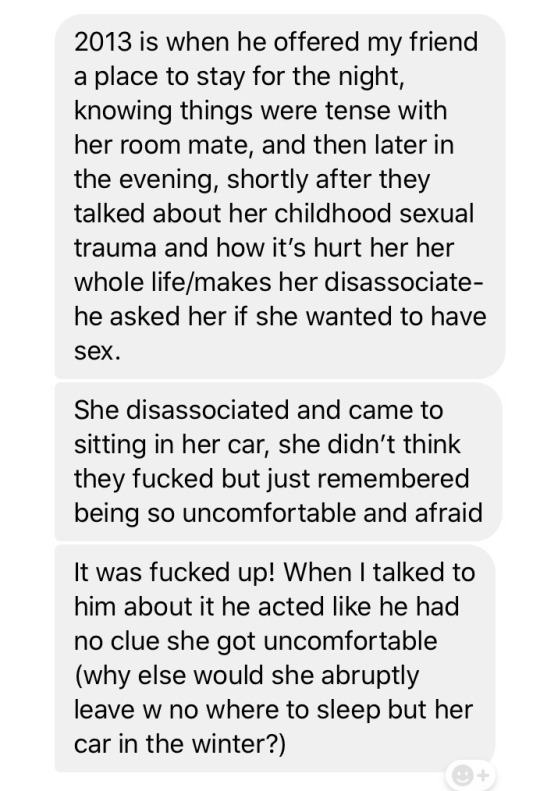
Predation and sexual exploitation is a common tactic among men in leadership positions because power often distorts perception. These men overestimate someone’s friendliness as sexual attraction which creates a dangerous pattern of entitlement. Here is testimony from a woman who experienced Battaglia’s abuse of power in response to her avoiding his prolonged, unwanted sexual advances:

Here is another example of unwanted sexual advances from March, 2019:

A third person explained how Battaglia groomed her at the beginning of her career in an egregious attempt to normalize his sexual advances :


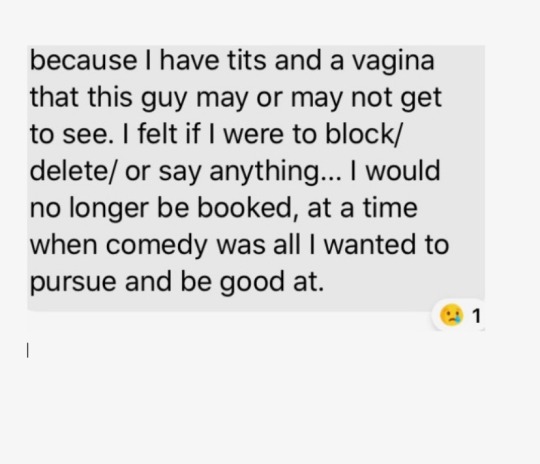
In a scene that is notoriously male-dominated, Woody Battaglia made numerous women feel sexualized, fetishized and unsafe. Sadly, this behavior escalated. CW: The following is an account of sexual assault.


There have been a few attempts at holding Battaglia accountable for his actions, but he usually gaslights survivors and/or their advocates:

Battaglia’s few apologies have been empty and without any notes of true remorse or motions towards rehabilitation. Often, people are unwilling or unable to recognize themselves as assault victims, thus lacking the ability to hold their assailants accountable. Predatory people rely on many things, including social hierarchies, shame, embarrassment and the culture of victim-blaming that happens when survivors come forward. Fear of an unfair legal system as well as police ridicule are also major contributing factors to this culture of silence.
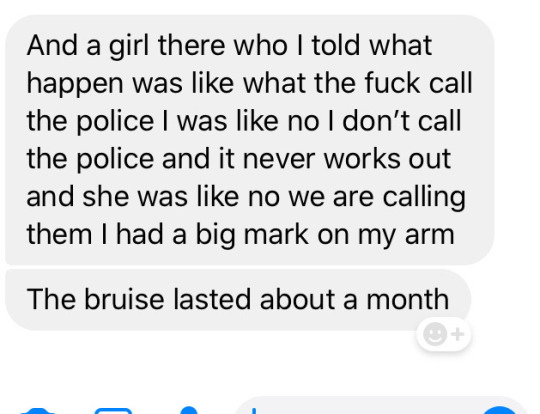
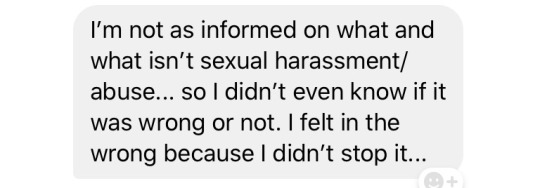
We have reason to believe Battaglia is aware that numerous women have come together to exchange stories of his serial sexual harassment, assaults, gaslighting and professional retaliation. Almost three hours ago, he sent his usual attempt at an apology to a woman where he incentivized her silence by offering free professional development:
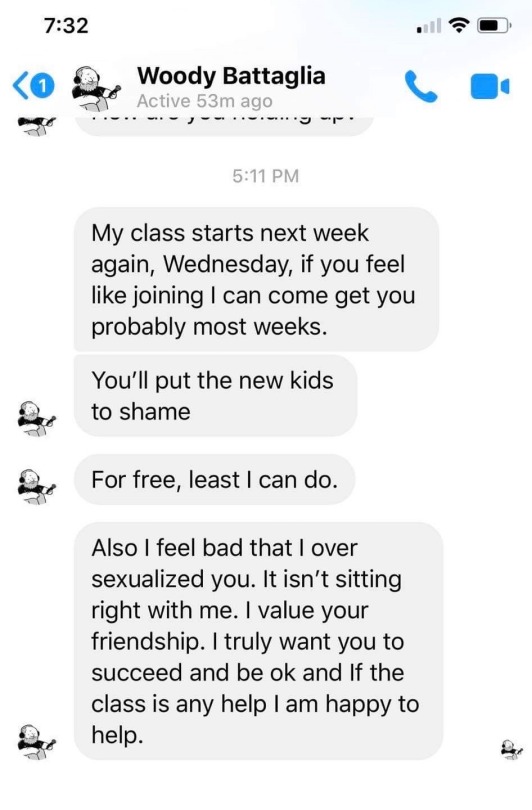
We are extremely grateful for all of the women who came forward and bravely used their voices to help put an end to Woody Battaglia’s devastating behaviors. This problem is not unique, especially within creative industries where men are often given positions of power and act as gatekeepers. These are not occupational hazards. These are CRIMES. As stated previously, we have no doubt more survivors will come forward. We will support any attempts made by them towards healing, safety, recovery and accountability. WE DEMAND: 1. Wood Battaglia be immediately removed from any roles of leadership within the comedy community and beyond. 2. Woody Battaglia provide any people willing to work with him a concrete plan to make amends, rehabilitate and honor the autonomy of his victims. 3. Men within the local comedy community make larger, more impactful efforts to speak up for women, femme and non-binary performers. INVEST IN US. PROTECT US. DEFEND US. FOREVER. If you are a survivor in need of help, please go to https://restoresas.org/ You are not alone. _ _ _ _ _ _ _ _ _ _ _ _ _ _ _ [We’ve decided to consolidate the updates so they are also in this original post] UPDATE 1: We have been informed by survivors that they wish to include Battaglia’s legal name, Ron Wood, in the initial post so we have amended it to reflect those changes. Two more survivors have come forward publicly and one of them has allowed us to re-post her response from last night to this page in hopes of submitting further evidence of Battaglia’s serial predation and, more importantly, to document an incident that dates earlier than 2013, as previously reported. The following incident is from 2012 :

We continue to be in awe of the bravery these women have shown. Coming forward with these testimonies is such a vulnerable and costly action, even when protected by anonymity. Though the solidarity of survivor-kinship can feel validating, these women are still hurting and are likely experiencing new levels of harm by reading the accounts of others. It is our duty to affirm the anger and sorrow of these women, and all survivors, everywhere. The strength they have shown is not only admirable, but life-saving. In order to achieve true liberation for all, we must actively invest in the uplifting of community members’ voices, especially those historically silenced. We have the power to strengthen our communities from the inside. We don’t need saviors. Men: take action. Step up. Call your brothers in and have the hard conversations. Follow through. This work is a daily grind. Ask yourselves if you’ve done the actual work, or if you’re being performative. Remember, saying nothing also says something. To disengage from this conversation is to employ systems that continue to replicate the violences of oppression and, specifically, rape culture. No more. We’ve had enough. _ _ _ _ _ _ _ _ _ _ _ _ _ _ _ UPDATE 2: We wish to thank the local Rochester comedy scene and worldwide comedy scenes and unaffiliated individuals who’ve expressed public support of the women who’ve come forward and their lead advocate (a local comedian who has fielded and submitted all of the provided screenshots to us.) This is an extraordinary show of solidarity that gives us hope. The following screenshot is from 2013, submitted by Emily Champion, a former employee of the (now closed) Acanthus Cafe on East Avenue. She worked there for approximately nine months while Battaglia hosted an open mic series. As the open mic series was coming to its end, Battaglia sent the following inappropriate sexual advance to Champion (note the full month of non-communication between them) :
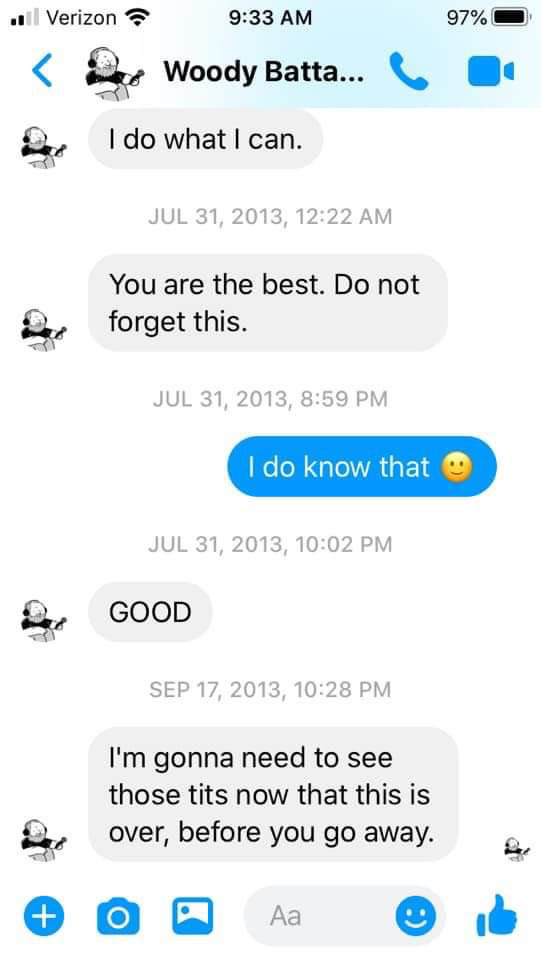
Each testimonial thus far has shown unwelcome verbal and physical sexual attention or instances of sexual misconduct and assault. The majority of women speaking up have noted their “subordinate” positions - Battaglia was in a role of power, abusing his social standing and their trust, causing them to fear social or professional retribution. In our experience with offenders within artistic communities, job insecurity and unreliable wages can be contributing factors in a person’s growing resentment of their “unappreciated” leadership roles. Over time, these people develop an inadequate sense of superiority and entitlement, justifying inappropriate sexual demands from people they believe “owe” them. Due to the voluntary nature of hosting and organizing, many victims lack proper channels to report sexual harassment or assault, leading to further exploitation.
For Those Struggling with The Allegations Against Battaglia
We understand and support you, too. Rape culture’s entire foundation is built on a myriad of the worst emotions / responses: confusion, shame, embarrassment, uncertainty, shock, fear and silence. Your close proximity to a predatory person does not make you complicit but it might require you examine whether you can actively assist in any prolonged rehabilitation and accountability efforts. Often, the immediate response to allegations of sexual misconduct or abuse are to ostracize or make threats to the offender. Everyone responds differently to news of sexual harassment and assault, but the healthiest response is to be supportive of survivors and not commit unlawful acts of retaliation. Yes, it is possible to believe the survivors and remain in healthy contact with the accused. Yes, it is possible to recognize the offender’s humanity and well-being while holding them accountable for their actions and assisting their rehabilitation if you choose.
Allow yourself space. Set boundaries. Seek a professional to support your own physical and mental health.
- - - - - - - - - - - - - - - - - - -
NOTE: Incidents like these are why we renounce performative activism: public displays of “woke-ness” (via political memes or declarations made on social media) are by no means indicative of how a person acts in their personal or private life. These displays are sometimes used to thwart recognition of problematic behaviors.
No community is immune to enabling predators. A way to be in direct opposition to this epidemic, which stems from power structures, is by explicitly opposing hierarchies within your community. Do not allow gatekeepers to happen (if there is A Leader of your scene, ask yourselves how they got there and why they've held their position if it’s been longer than a two year span.) Anyone actively working to liberate the most marginalized members of their scene will make efforts to elevate their roles, providing access to leadership positions and community empowerment. Good luck, Rochester. There’s so much work to be done. We’re rooting for you.
33 notes
·
View notes
Note
hi naruhearts! thank you soooo much for this blog. as a white person i want to do better and i know this is emotional labour for you, but i do ty for putting links that i can search up myself so u don’t have to educate me. i’m also glad j2m used their platforms. You’re an Asian supernatural fan and I’m sorry. i’m so sorry on behalf of white people who made it so hard for u and black people and other poc in this fandom. I’ve seen ugly things :/ we’re here to stand with u. like you said idk why it
Oh, your message might’ve gotten cut off! But nonnie, I acknowledge your message 🙏🏾
It’s definitely difficult. BIPOC/POC fans are pretty much outnumbered in the SPN fandom because the show has traction in white rural American demographic areas; the majority of fans are also scattered across USA. That being said, I’m not in the mood to revisit racially traumatizing interactions I’ve had in SPN fandom thus far (there’s been quite a few though, oh boy, tiring) — and white women, some of whom I considered friends in the past, eventually thought that being friends with an Asian activist-and-fan was too exhausting, unsettling, or uncomfortable for them (Note: I make mistakes as an individual; I’m not perfect at all) — but let me get to the point, and I don’t want to detract from it:
The Asian community is still complicit in the murder of George Floyd and countless other Black folx. We are complicit via colonial manipulation, in which our people were written off and implemented as “model minorities” by racist North America to establish respectability politics and further the -otherence of Black folx. Anti-blackness is global. Again, although I’m part of another marginalized, -othered, systematically oppressed ethnic minority — and although we stand in solidarity/rage with Black folx against the same racist, white supremacist, and colonial system — our lived racial experiences are not the same. We’re not equal (of course, YELLOW PERIL, Orientalism, and anti-Asian racism are prominent in the age of COVID-19 — and always has been — but we still remain another cog in the white supremacist machine collectively against Black folx).
In particular, internalized (anti-Black) racism is engrained in Filipinx culture. The Philippines has been colonized for so long — by Spain, then America (termed benevolent assimilation by McKinley during the Philippine-American war; such colonial attempts were disguised as (white) saviourism from Japanese occupation in WW II as well; we were supposed to “owe” the Americans) — that we have absorbed white colonial ideals of anti-Blackness ourselves. Skin-whitening products run rampant back home. We were taught that USA and Spain were the true lands of opportunity — an entire behavioural and physical model for the attainment of white perfection. Filipinx were taught by their parents, and their parents’ parents, to be scared and racial-microaggressively aware of Black folx in hoodies walking by you on the street. Black has become the “trend”, with fellow Filipinx spewing the N word freely, incorporating cornrows into their everyday fashion routine, and/or expressing eagerness to label white-passing/biracial Filipinx, be it 1/30th or 1/2 Filipinx blood, as one of our own. Miss Philippines candidates often — not always - but often — fit the biracial mould of white-passing beauty standards, henceforth erasing the value of darker — Black — skin. Decolonization, desegregation, and removal of this internalized anti-Blackness by the Asian community is a lifelong process and must continue.
George Floyd died at the hands of white Derek Chauvin and a fellow Asian police officer. We’re solely responsible for holding our entire community accountable, both online and offline. Black folx must be empowered by our non-Black POC allyship and white allyship in a predominantly white supremacist system. Please use your privilege to elevate their voices!
#asians4blacklives#filipinx4blacklives#-mod naruhearts#supernatural#adjacent#racism#spn + racism#fandom racism#black lives matter#justice for george floyd#white privilege#ask
12 notes
·
View notes
Text
Shigaraki and the Pleasure of Destruction
“Central to the effect and fascination of horror films is their fulfillment of our nightmare wish to smash the norms that oppress us and which our moral conditioning teaches us to revere.”
-Robin Wood
Shigaraki’s backstory in BNHA is marked with excessive violence and outpouring of bodily emotion, bodily fluids, and bodily destruction. This destruction and excess arise as a reaction to the stifling paternalistic system under which Shigaraki / Tenko is subjected and abused. Horikoshi conveys the violence as a scratching of an itch – the relief of a persistent sense of discomfort. The destruction is repeatedly portrayed as a pleasure to Tenko – a pleasure that arguably extends to the reader who occupies his perspective. This post uses horror film theories to argue that Shigaraki’s pleasure in destruction comes from bliss and catharsis in destabilizing the oppressive system he and the reader are subjected to, and takes relief in abandoning socially sanctioned behaviour.
[Author’s note: This reading zooms in on chapters 235 & 236 only. Points here are made as opinions and hypotheses, not statements of fact, i.e. this is just one way of reading the text. Most theories cited here apply mainly to analysis of Western horror films; yet I cite these ideas believing they are applicable here, given the chapters’ horror elements, and American media’s partial influence on BNHA. This discussion covers aspects of the Japanese family unit and attributes some influence to Confucianist thought. This is not an attempt to disparage another culture, because I am, unfortunately, also subject to a society informed by such codes – filial piety especially. If you believe it is within your jurisdiction, critique where necessary.]
The Symbolic System of the Paternalistic Family Unit
Tenko’s destructive outburst is a reaction to the symbolic system of his Father’s household. Here, ‘symbolic’ is a term used to refer to that which acknowledges and abides by cultural and social laws and rituals [3]. In the microcosm of the Japanese nuclear family, the father is the daikokubashira (the man of the family, the central pillar on which the family leans on) [7], and Tenko is subject to paternalism, collectivism, and conformity. This helps us understand why his father has such a strong hold over his family – his power is not just financial; paternalism is deeply ingrained as a sociocultural norm:
In traditional Confucian thought, women were inherently subordinate to, and were expected to serve and obey men. This form of female subordination to male dominance and authority supports the social belief that males were responsible for protecting, defending, and guiding those inferior to and dependent on them. As Sugihara notes, “[T]he Confucian ethical system emphasizes a harmonious society in which a hierarchical structure is maintained…which assumes… men’s dominance over women and children.” [4]

The opening panel establishes the house which five-year-old Tenko is subject to. The home – both the physical space and the social ladder of the family – is an ordered system literally and hierarchically built by his father.
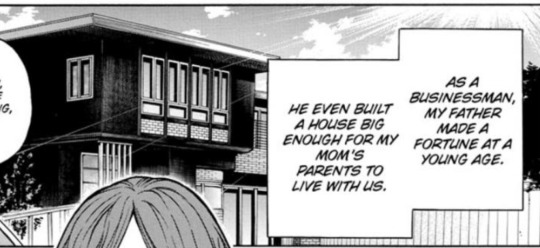
This is fact is continually reinforced each time a restriction or punishment is imposed on Tenko, emphasizing his suffering as a result of his father’s heavy-handed rule.
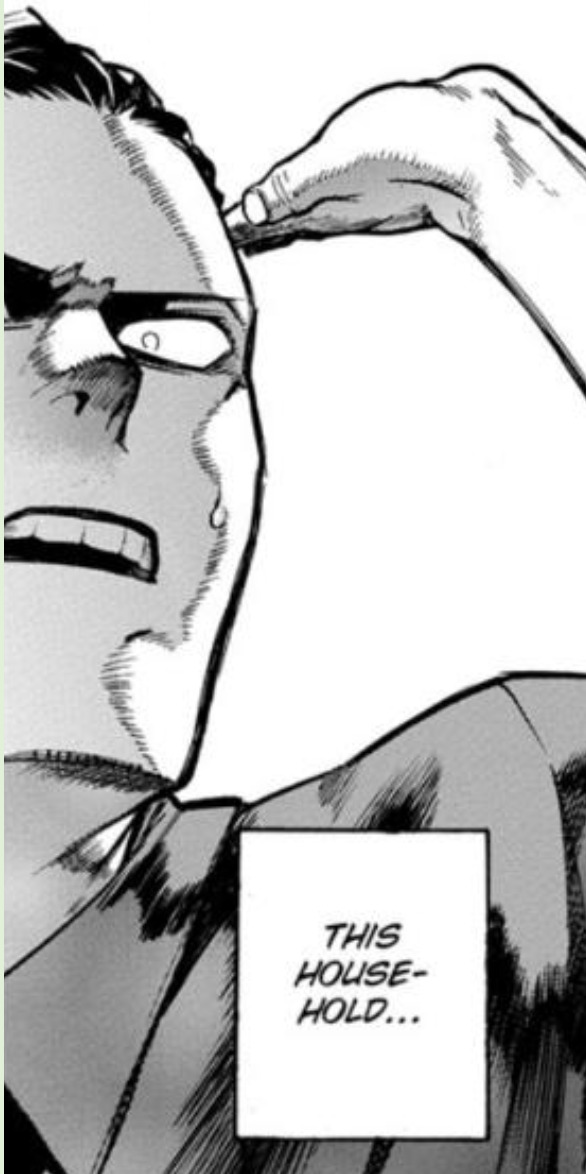
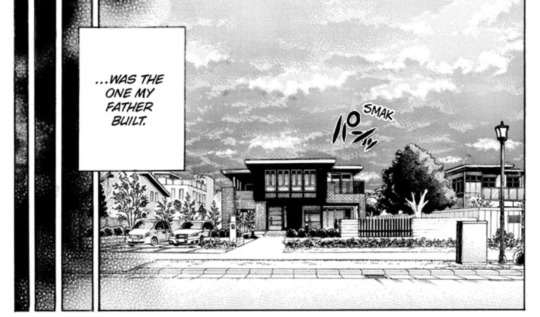
It is a house run on order, reason, and restraint, which necessitates repression and discipline. Shimura Kotaro’s rule against heroes appears a logical outcome of his own childhood experience of abandonment by his mother Shimura Nana – it is a restriction imposed to minimize risks to his family. This prohibition represses his own boyhood desire for his mother (suggested by his emotional response to her letter) and this repression is extended to and projected onto Tenko.
But unlike the adult Kotaro who is repressed and seamlessly interpellated into this symbolic system of discipline, Tenko is a child, and therefore immature – more impulsive and driven by infantile want (“children are more self-centred and straightforward than one would expect”) – his simple desire to play hero transgresses the order of the home, specifically, the rule against heroes. He is disciplined for this, leading the reader to view the symbolic structure as unfairly repressive, authoritative, and disciplinarian.
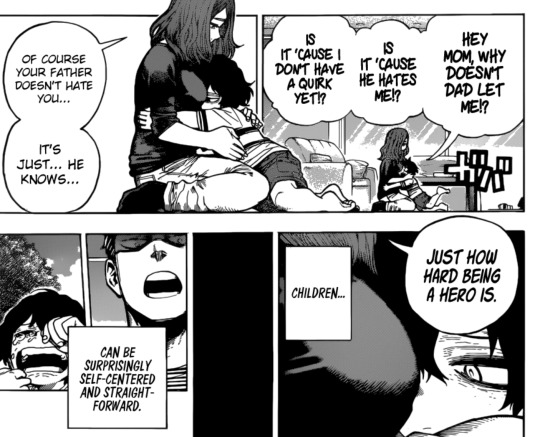
Tenko’s rule-breaking is not the only way the text demonstrates his segregation from his household. His difference and emotional turmoil manifests physically as excess outbursts of bodily fluids, bodily movement, and sound (these notions of “bodily excess” are derived from Linda Williams [5]). In other words, the text clearly shows us that he does not fit into his home’s strict system through:
Excess bodily fluid & discharge: tears, mucus, and broken skin from scratching, vs. the relative cleanliness of the house, and the complete, stable, contained appearances of his other family members
Excess bodily movement: scratching, flailing and shuddering, vs. the controlled stiffness and posture of his father’s bodily movements
Excess sound: weeping, shouting protests, begging for mercy vs. the communal silence and denial of his mother and maternal grandparents, who only protest quietly and ineffectually, silently consenting to “taking [his father’s] side”
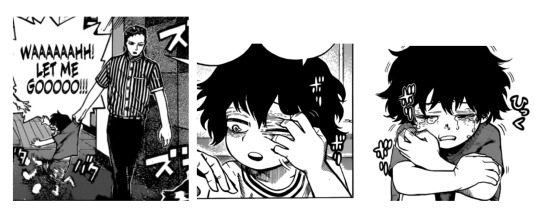
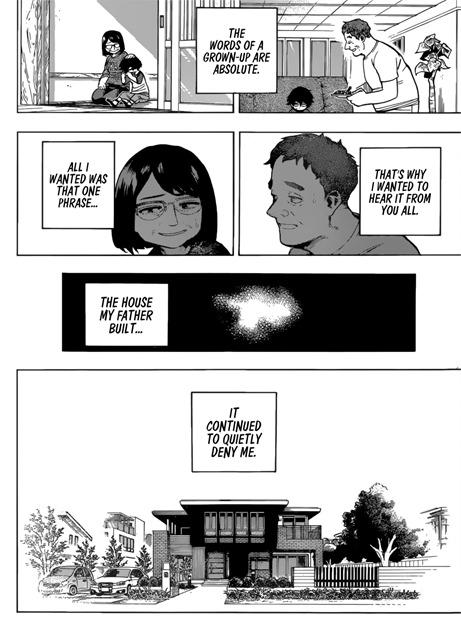
Of these tics and mannerisms, most notable is his itching – the clearest, most visceral manifestation of his bodily and emotional discomfort. The blemishes on his face visually mark him out as the odd-one-out in his family, the broken skin gives clear indication that he is in bodily pain. This uncomfortable affliction is a direct result of his father’s abuse and his family’s non-interference: it arises only at home, and he scratches most violently when his father’s violence (and family’s ‘betrayal’ of complicity) reaches a climax:
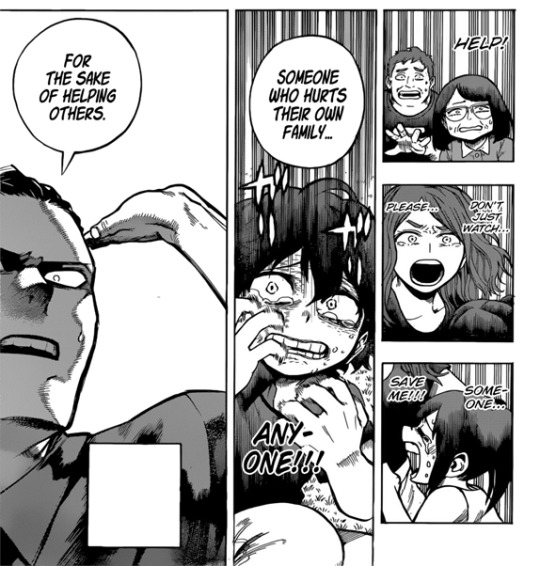
Tenko’s bodily excesses are physical materializations of his painful emotional slippages from the system. In other words, it is as if his (invisible) pain is rendered visible as material symptoms; as if the restrictions imposed on him literally hurt him and draw blood. This is somewhat relieving to see as a reader because when emotional pain is so clearly materialized and visible, it is an affirmation and validation that it exists – it is something you can see and feel, and is therefore undeniably real. In short, Tenko – simply by being himself, true to his immature desires and without the ability to repress this – is oppressed by his father’s household, which is run by a symbolic system of order. While this demands one’s body to be stiff, controlled, sanitized, clean, presentable, and containable, and behaviour to be quiet, compliant, and submissive, Tenko's excess of emotional thrashing, crying, bleeding, scratching and protesting is a clear transgression of this. As punishment, he is frequently expelled from the house – an individual outcast from the system.

The Pleasure of Bodily Excess and Destruction
As a result of his natural childish desire and bodily excess, he is not ‘symbolic’ – that which abides by the social code – but ‘abject’: that which does not respect borders, positions, rules, and disturbs identity, system, order. [3]
“The abject threatens life, it must be radically excluded from the place of the living subject, propelled away from the body and deposited on the other side of an imaginary border which separates the self from that which threatens the self” [3]
As mentioned, I’m employing theories used in analysis of horror films, which typically portray battles to reject and disavow the abject threat of the monster, to push them safely over the border to protect the symbolic self. Under the symbolic system of his house, Tenko’s father delineates the boundaries, i.e. borders, of the house; he retaliates when Tenko crosses the boundary into his private study, expelling and quarantining the abject, rule-flouting Tenko to the yard.
This scene of discipline and restoration of order happens in garish daylight, under which people, actions, and the ordered space of the home is illuminated, visible, comprehensible. This gives way to night as we move from chapter 235 to 236: under the darkness and low visibility, things become incomprehensible, nightmarish, and a dream-like fantasy of vengeance unfolds.
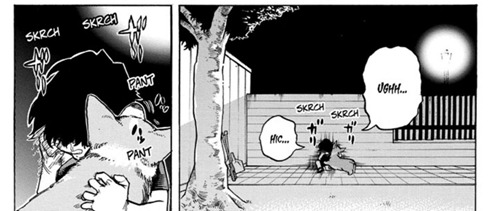
This section asserts that the horrifying spectacle of Tenko’s unbridled destruction of his family and home is pleasurable for him and the reader because it is the moment he cathartically destroys the symbolic system that oppresses him, and all who are complicit.
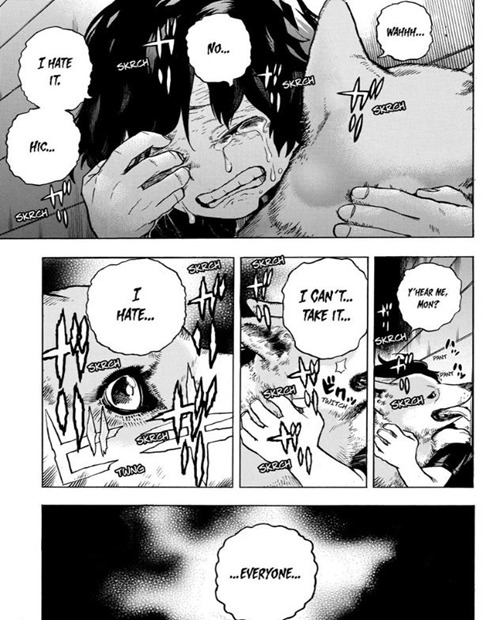
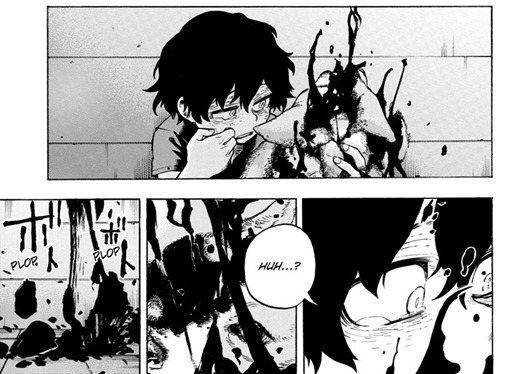
The first death enacted by his quirk is gory, unexpected and alarming. We share Tenko’s distress because it is uncontrollable and accidental. As it comes right after he pitifully despairs that he hates his whole family, Mon-chan’s demise is almost seen as a result of that hatred; it is as if his emotional, immaterial pain and itch for vengeance has finally taken material form, become a physical force, through his newly manifested decay quirk. Thus, even though panicked, there is an arguable degree of relief at this release of a pressure valve, and the deluge that follows is extreme.
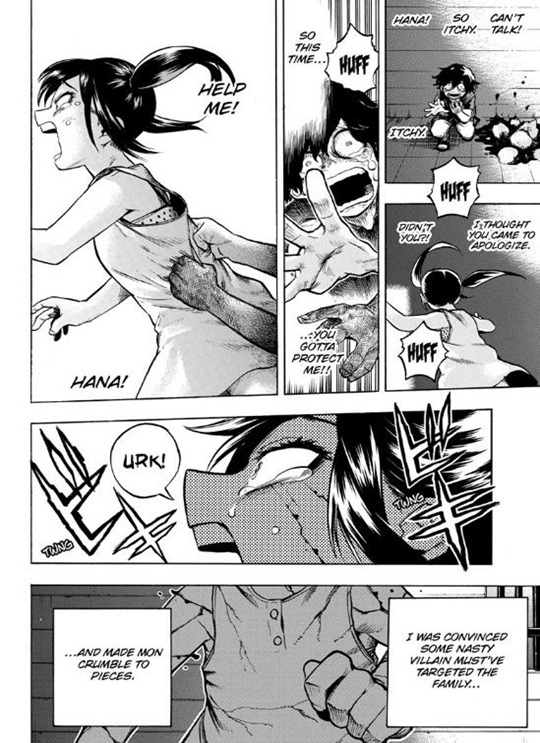
The first person he kills is his sister. Previously she was positioned as a sort of helpless and fearful conspirator – she understands and navigates the symbolic system well: she lies to their father that she wants to be a housewife instead of a hero, and lies again about Tenko initiating the break-in to his study – and had managed to dodge punishment and remain mostly in her father’s favour. She had been allowed to remain safely inside the house while Tenko was expelled – physically and socially. Here however is a terrifying spectacle in which she comes to mimic his bodily excess – she cries, screams, bleeds just as he does. Because Tenko’s internal dialogue here begs for her to protect him as she failed to before, Hana’s destruction is possibly Tenko’s unconscious, uninhibited, primal desire to punish her for betrayal – to unify the both of them under his pain.
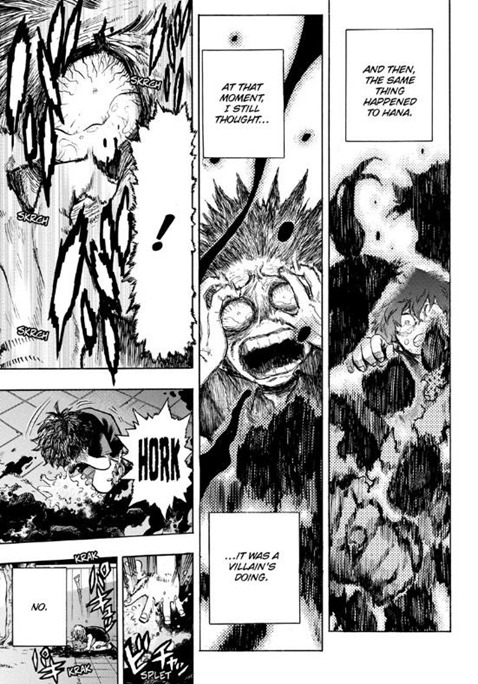
As the blood and gore escalates, so does Tenko’s own bodily excess. Speech breaks down as his voice does; a panel of his face contorted in an anguished scream as hair stands on end, eyes wide and bloodshot, vividly exhibit this emotional deluge and breakdown of sense and communication; a panel gives an uncomfortably close-up shot him clawing at his itching skin, drawing blood; he vomits loudly, uncontrollably, he trembles, shudders. His body releases, spills, spews excess emotion, fluid, destruction – manifestations of the extreme emotional pain and malaise that he’d built up from abuse, swelling inside him to a burst of excess spillage. This is further confirmed in his destruction of his mother and grandparents:
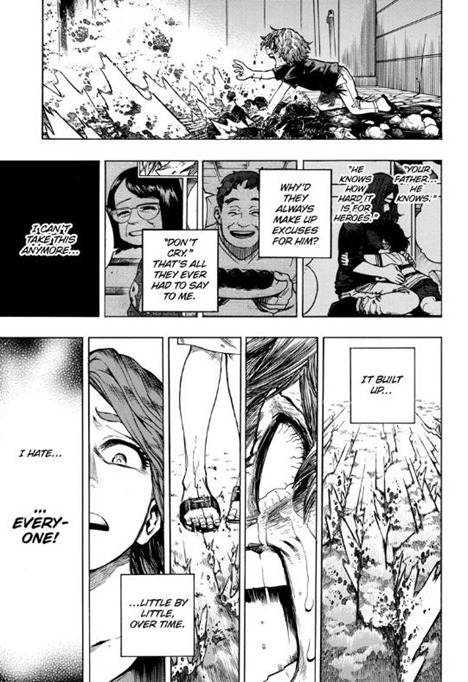
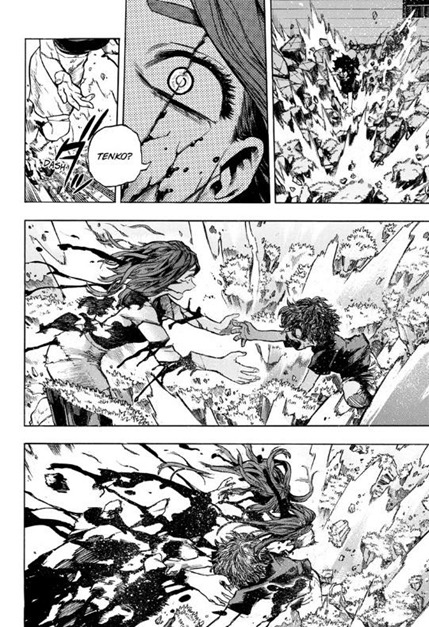
He explicitly demands to know “Why did you take dad’s side?” and professes his pent up fury toward their docile submission, leaving him to suffer alone. He reduces their whole, presentable, bodies to unsightly, dismembered corpses, and thereby reducing them to the same abject defilement as himself; he wipes away the patient, chastising comfort from their faces to elicit the reaction he had desired from them in his moments of need: panic and alarm. In this act, the communal silence towards his abuse is finally transformed to mutual suffering, screaming, and bloodletting.

The Pleasure of Destabilizing Social Norms
Linda Williams asserts that horror is a genre that can “address persistent problems in our culture […] violence & emotion are a cultural form of problem solving” [5]. In Shigaraki’s backstory, domestic violence is the problem, and violence in equal or excess measure is the solution (while his mother and grandparent’s non-violence did not work against his father). Paternal control over the house is the problem, and a complete obliteration of that system and house is the solution. Furthermore, Tania Modleski cites Roland Barthes’ notions from “Pleasure of the text” to argue that contemporary (Western) horror films abandon plasir (pleasure from confirmation of one’s subject position i.e. confirming your perspectives, values of the world and your place in it) and instead offer jouissance (bliss from dismantling and undermining of one’s subject position; indulges in destabilization, pleasure of destruction, allows abandonment of normal modes of thinking) [6]. This is the pleasure Tenko describes when he fully indulges in the climactic act of destroying his abusive father and entire house, and in doing so, frees himself from subjection to the symbolic system.
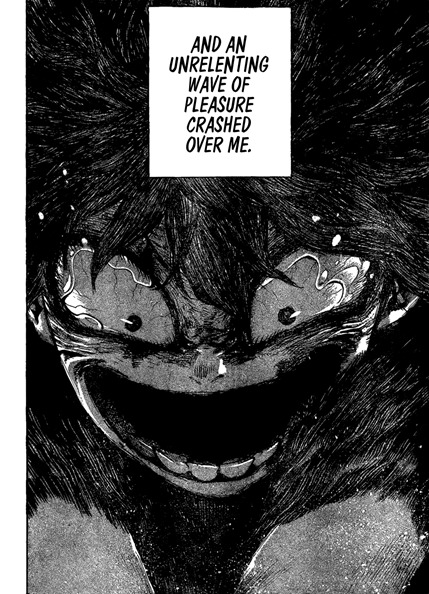
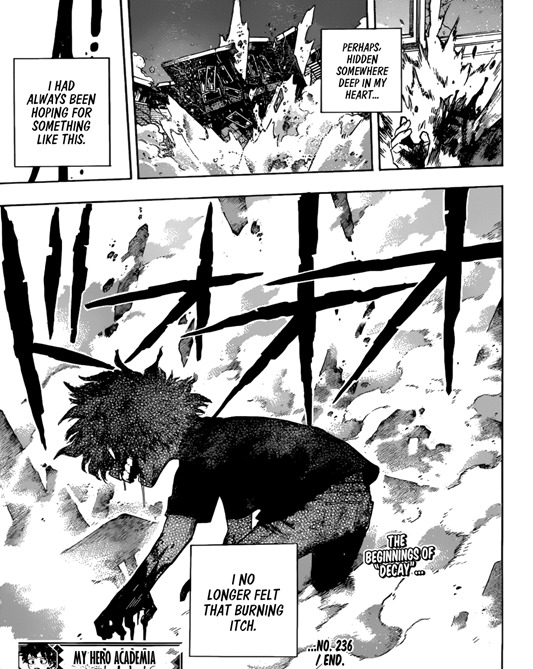
In a wider context, the family is a basic unit (and microcosm) of Japanese society, and the anxieties of said society are visualized through kaidan – ghost or horror stories. In such stories, the child ghost / monster conveys a fear of the young’s disregard for and role in destroying the family:
In an interesting twist to the cinematic kaidan tradition, contemporary films' exploration of these familial and larger social anxieties revolves around the figure of the monstrous child ghost. In these films, the traditional figure of the adult female onryō is supplanted by a terrifying teen or preteen wraith. These films' representations of children and young adults transformed into disgruntled, vengeful, supernatural entities after (perceived) betrayals by their parents hints at dominant Japanese concerns that the growing dysfunction and disintegration of traditional familial and social structures have led to the emergence of a new generation of young people who have taken on distinct, potentially problematic identities, including otaku, the shojo, and the kogyaru, which are characterized by a detachment and disengagement with the larger (often adult) community. [...] Where earlier incarnations of the onryō were either appeased or vanquished after attaining vengeance (Oiwa, Okiku, and Lady Mamiya), contemporary onryō defy all attempts at containment; instead, their hunger for destruction is presented as infinite, perhaps reflecting society's deepest fears about the immature, unsocialized youth generation's incoherent and uncontrollable appetites. [4]
Thus, I read Shigaraki’s backstory as a fairly relevant presentation and critique of societal fault-lines – in particular, the hurt and dysfunction caused by unchallenged abuse of paternal, patriarchal power, possibly enabled by a society and family unit guided by Confucianist thought and ideology, including respect for parents, community over self, social harmony over personal indulgence among others. Tenko’s failure to contain the emotional burden of his abuse under such an environment, one that overflows in a deluge of excess bodily emotion, fluid, movement and force of destruction – offers jouissance through destabilizing the structure that binds subjects to the moral and social obligations of the paternalistic nuclear family.
Arguably, the reader, forced to occupy Tenko’s perspective, experiences this pleasure vicariously. This monster child of sorts represents the kind of infantile and primal urge we suppress, fear, and reject. Through this fictional surrogate, we gain access to the act of fleeing moral conditioning and destroying the paternal / creator / rule-maker and his system, thereby liberating us for self-determination, self-definition, self-rule. Through this explicitly visceral excess, we are caught in his euphoria of empowerment and destruction, in a sort of involuntary mimicry. It is a power fantasy of subverting the hegemony that dominates.
Liberation to a Limit
In the wider narrative of BNHA, this liberation from the symbolic system is arguably limited. The chapters detailing his escape from the system are aptly named “Shimura Tenko: Origins”.

His identity under his family and thus his family name are abandoned, and he is reborn as Shigaraki Tomura. The sequence of chapters suggest a progression from oppressed subject Tenko to liberated Shigaraki. However, given the fact Shigaraki is named and guided by All-For-One, it seems as if this merely substitutes one paternal figure for another. Perhaps subsequent plot developments might offer some opportunity for his self-determination, under an identity and following a path that he himself constructs. We can only wait and see.
References
1. Horikoshi Kōhei, “Boku no Hero Academia (僕のヒーローアカデミア)”, Chapter 235-236.
2. English-translated manga screencaps obtained from VIZ <https://www.viz.com/my-hero-academia>; Jamini’s Box <https://jaiminisbox.com/reader/series/my-hero-academia>; and cross-referenced to mangastream <https://readms.net/manga/my_hero_academia>.
3. Julia Kristeva, “From Filth to Defilement”, Powers of Horror, 1982.
4. Valerie Wee, Japanese Horror Films and their American Remakes, 2013.
5. Linda Williams, “Film Bodies: Gender, Genre, and Excess”, 1991.
6. Tania Modleski, “The Terror of Pleasure: the Contemporary Horror Film and
Postmodern Theory”, 1984.
7. Thank you Luka for informing me of the term, translation help, and proofing.
#shigaraki tomura#shimura tenko#meta#bnha#boku no hero academia#shimura kotaro#bnha manga spoilers#works#歪#啊啊啊生活好幸苦
185 notes
·
View notes
Photo
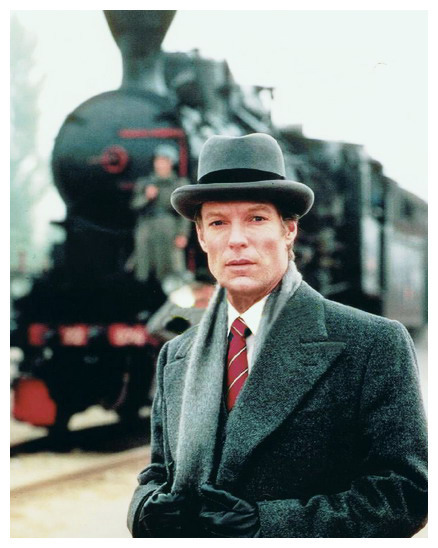
ALTERNATIVE STYLE ICON: RICHARD CHAMBERLAIN IN WALLENBERG: A HERO’S STORY
by Réginald-Jérôme de Mans
The writer George Santayana famously wrote that those who cannot remember the past are condemned to repeat it. Ironically many who repeat his quote forget who first uttered it.
I had long meant to write about Richard Chamberlain in this role. I once referred to him as “the fey king of the miniseries” and I don’t regret it: foppish, almost milquetoast in fare as varied as a two-part TV version of The Bourne Identity (with Jaclyn Smith, natch), Shogun, and as a leading candidate for an honorary Seinfeld puffy shirt: Not only did he play the Count of Monte Cristo in a 1975 TV movie, but a bunch of what Elaine Benes would have called chandelier-swinging characters in other Dumas adaptations, including Aramis in Richard Lester’s The Three Musketeers and Louis XIV and his twin in The Man in the Iron Mask. Postmodern swashbuckler author Arturo Perez-Reverte even described a character in one of his own novels as looking “like Richard Chamberlain in The Thorn Birds, only more manly.” That same Thorn Birds role, Father Ralph de Bricassart, also inspired a certain Rhunette Ferguson to give her son, a future New York Jets player, perhaps my favorite name ever: D’Brickashaw.
Dubbing Chamberlain an Alternative Style Icon for his role as Swedish diplomat Raoul Wallenberg is low-hanging fruit. For years this TV special dwelt at the bottom of my Netflix queue for that express purpose. Former Savile Row tailors Manning & Manning won an Emmy award for the outfits they made for him; decades later Bryan Manning had some very interesting things to say to the inimitable Simon Crompton of Permanent Style about the 1930s and 1940s cutting styles he had to adopt for Chamberlain’s outfits for the movie. Chamberlain’s costumes are appropriately dashing, from the full diplomatic gala white tie ensemble worn while conspiring with the Papal Nuncio of Budapest to a tan double-breasted suit with horizontal peaked lapels that is, quite simply, magnificent. Zagreb, one of the most beautiful cities in eastern Europe, admirably filled in for 1940s Budapest and Stockholm in the making of this production. I’m fairly certain that I’ve stayed at the Zagreb hotel on whose esplanade Chamberlain wore that suit, in an early expository scene where the American and Swedish governments encourage Wallenberg to take a position with the Swedish legation in Budapest. I’ve been told Zagreb’s one of two cities in Europe where the street lamps in certain neighborhoods are still gaslit. Gaslighting happens to have been one of the reasons that I finally wrote about this icon.
Of course there’s plenty to mock in the conventions of this telefilm, even beyond Chamberlain’s indisputable 1970s and 1980s stock hero status: its heavy-handed setup and plotting, making Wallenberg out to be a one-man anti-Nazi force from his time at home in Sweden (wearing a U. Michigan sweatshirt to indicate that he had studied in the US - did college sweatshirts even exist back then?). Miniseries meant melodrama and its archetypal characters: an adorable child whom Wallenberg saves from the death camps only to die of illness; a shoehorned-in love interest in the form of a kindhearted baroness who lobbies her suspicious husband to relax the Hungarian government's strictures on Jews; a fiery Hungarian resistance fighter who provides the unofficial, combative counterpoint to Wallenberg’s diplomatic, humanitarian efforts through official channels. And, of course, Wallenberg’s kidnapping by the Soviets at the fall of Budapest meant his story was perfectly framed for 1985, when we still couldn’t trust those Russians. (In fact, to this day no one knows what they did with him.)
A few appropriately haunting and powerful moments do ring true, including Wallenberg’s cordial verbal fencing matches over contraband Scotch and cigarettes with Adolf Eichmann. Whether those meetings really took place in that form or not, their film versions appropriately capture the realities of how we are forced to engage with evil. Rarely are we simply battling an easily identifiable other, weapon to weapon. Instead, we encounter evil in the everyday – in fact, it seeks us out, finds shared ground, converses with us over pleasantries and hospitality even as we recognize its intentions. It identifies with us, we identify with it. Even as you know it is evil.
Eichmann had made it his avowed duty to kill the Jews of Europe. Wallenberg’s mission, as an emissary of an officially neutral power, was to help save as many as he could. And he did, through famously fearless, reckless endeavors including the distribution of thousands of official-looking Swedish passes to the Jews of Budapest, the creation of vast cultural centers and warehouses in the Swedish mission buildings in which these new countrymen could work under the aegis of their adoptive country, and savvy diplomatic maneuvering with the Hungarian and German authorities and military. He went as far as to climb on top of a train bound for Auschwitz and distribute passes to as many deportees as he could while soldiers fired shots at him. Looking back, historians suggest they were firing over his head to warn him as they could easily have dropped him at that range, but it’s not likely Wallenberg knew that at the time.
At that time diplomats of neutral powers could make fortunes more safely as armchair heroes: playboy Porfirio Rubirosa reportedly did so in Paris selling visas to the Dominican Republic to French Jews during World War II. In that respect, perhaps, both he and Wallenberg were heroes… of different sorts.
Wallenberg did not do it for money. The Wallenbergs were Swedish aristocracy (with, the film takes pains to remind us, an ounce of Jewish blood) with considerable means – hence the finely tailored wardrobe for Chamberlain. Thus, an easy cynical response to this essay could be that a rich aristocrat with diplomatic immunity risked nothing swanning around the salons of Budapest, just like the fictional gentleman spies we read about and watch on screen.
That response is wrong. Heroism is not just born of opportunity. It is recognizing when a choice confronts you and taking the difficult, unpopular and dangerous one in order to do what is right. Fictional heroes like Bond or Steed rarely suffer meaningful personal loss and rarely confront the reality of evil. Evil is your friend with many positive qualities, maybe more intelligent or cultured or better dressed than you, the one you looked up to, who gradually reveals the awful things he or she believes and has done. Evil is those complicit in carrying out those things by their inaction, their credulity, or their cooperation, not at the point of a gun but of a paycheck. Evil is legal, logically explained, repeated and reported until its baseless reasoning becomes fact and the foundation for more lies, more evil. Evil can so easily become the system.
Hindsight is a handicap, for it doesn’t usually permit us to see that there were no times without ambiguity in battles between good and evil and no certainty that good triumphs. We have the privilege of retrospect to acknowledge the dashing diplomat in Savile Row suits was a hero for saving innocents from deportation and death as part of the most ghastly genocide in history. We learned what genocide is, and had to invent the word to describe it. Because at that time the people singled out for persecution and death were unpopular, historically, socially and legally marginalized, supposedly easily identifiable and classifiable. A group that societies had made it easy - through regulation, ghettoization, oppression and antagonism – to hate, and whole false narratives drawn up to explain why that group hated and wanted to destroy us even more than we them.
One of A Hero’s Story’s most timely and inspiring lines is Wallenberg’s reply to the Hungarian ruler’s query why the King of Sweden cared so much about the Jews of another country, when he was a Christian. Wallenberg reminded the prime minister that the King’s “concerns transcend religion or national borders.” That concern is humanity, our lowest common denominator, our shared recognition of our capacity for suffering. That concern drove a man to acts of incredible selflessness, a generous mercy that seems to have cost him his liberty and his life. There is no romance to Raoul Wallenberg’s fate. It is worth remembering that he probably saw little romance in the actions he took in Budapest.
Now is no less an unromantic time, no less a time when others – so many different others –are easily denigrated, feared, distrusted, brutalized. Otherization, both of many within our borders and pressing against them, has returned, as has fascism, with apologists blandly elegant or brutally populist, like some inauspicious comet in our skies. Now, again, is a time for heroes – men and women who recognize how difficult and dangerous it is to do what is right. That struggle is far from those of Chamberlain’s habitual roles swashbuckling against a monolithic, universally despicable, evil. Evil is among us, habituating us, desensitizing us, gaslighting us. Far from frills and fanfare, celebration, or certainty of triumph, can we place ourselves in Wallenberg’s Budapester shoes and do what is right?
Quality content, like quality clothing, ages well. This post first appeared on the No Man blog in February 2017.
8 notes
·
View notes